#what more could you ask for from Napoleon’s antagonist?
Explore tagged Tumblr posts
Text

Adding Alexander knew the layout of Napoleon’s place by heart because he checked the updated floor plans every month for 4 years to the Napalex lore
Source: Philip Mansel, The Court of France: 1789-1830, p. 148
#Alexander was the kind of man who blurred the lines between committed lover and dedicated enemy#and really#what more could you ask for from Napoleon’s antagonist?#Philip Mansel#The Court of France#Napoleon#Tsar Alexander I#napoleonic era#napalex#Tuileries
90 notes
·
View notes
Text
Palpatine's Plans
Palpatine’s plan to bring his empire to fruition might seem straightforwardly simple to those who only see him as an evil mastermind striving for ultimate power. But beyond the surface, Palpatine doesn’t fit the profile when it comes to popular representation of the greedy villains whose actions are motivated simply by…evil.
The dangerous of Palpatine is not in the Dark Side, his true vileness is much more mundane than most people realize. Some may hate him because he’s a villain, but once we understand his plan – and why it succeeded – we begin to fear him for a very different, very real reason. Palpatine is an effective and terrifying antagonist because all his goals have already been accomplished in human history multiple times, and it can, unfortunately, happen again.
Sure, his main goal wasn’t all that different than most cartoonish villains, he wanted the world. Or, in this particular case, the whole galaxy. The difference is in how he accomplished it. Unlike his fellow villains, his power grab was grounded in that little word that made so many fans turn their backs to the prequels: politics.
Palpatine did not break the system with a sledgehammer to get what he wanted. He used it. From within, he learned the weakness of the political system and explored it for his purposes. However, real brilliance of his plan lies in the fact that he didn’t removed people’s agency to get his way. He offered choices (terrible choices, of course), but choices, nonetheless.
So this is how liberty dies...with thunderous applause. – Padmé Amidala in Episode III: Revenge of the Sith
People did not applaud the rise of the empire because they were being forced to do so or because they were scared. Most of them, believed they were witnessing the beginning of something great. That the fall of the democracy could not possibly backfire on themselves.
But for us to understand the intricacies of his plans we have to understand the main weakness of the system Palpatine was trying to subvert and overtake: corruption. In the end, his success was the result of a corrupt, debilitated government ignored by an alienated population.
That, in a nutshell, is the story of the "Star Wars" prequels: the triumph of empire over democracy, facilitated by Anakin Skywalker and resulting in autocratic rule by Chancellor (later Emperor) Palpatine. […] But before filming, George Lucas studied real transitions from democracies to dictatorships — which sometimes occurred right after nations had moved to embrace democracy in the first place. He asked why "the senate after killing Caesar turn[ed] around and g[a]ve the government to his nephew?. . . . Why did France, after they got rid of the king and that whole system, turn around and give it to Napoleon?" He noted, "It's the same thing with Germany and Hitler. . . . You sort of see these recurring themes where a democracy turns itself into a dictatorship, and it always seems to happen kind of in the same way, with the same kinds of issues, and threats from the outside, needing more control." The problem is "a democratic body, a senate, not being able to function properly because everybody's squabbling." [You may hate the 'Star Wars' prequels -- but they predicted our current political era - By Cass R. Sunstein]
Palpatine’s purpose was to destabilize the Republic, weaken the Jedi Order, seize power and annihilate any source of opposition. He accomplished that by instigating a civil war, spreading fear and paranoia, generating social and economic chaos, depleting the Jedi Order’s resources, and gaining popular support by selling the image of himself as a kind, fair, compassionate leader.
As cruel as it was, his course of action was brilliant. If he had simply attacked the Republic or sized control violently people would rebel. Extreme political (and social) actions and stances will always attract opposition (internal or external). It’s what happens in our world and what happened later with the Empire. People are okay with their rights and liberties being slowly removed as long they feel they are still in control.
And the Jedi rebellion has been foiled. The remaining Jedi will be hunted down and defeated. The attempt on my life has left me scarred and deformed. But, I assure you, my resolve has never been stronger. In order to ensure our security and continuing stability, the Republic will be reorganized into the first Galactic Empire for a safe and secure society.- Palpatine
Palpatine’s speech parallels what was happening in our own reality when the movie was first released, with Americans citizens having their liberties stripped for the sake of security, using the fear of terrorism to quickly pass controversial legislation.
If he had just used the Trade Federations’ resources to invade the Republic and named himself emperor, the public and the jedi would’ve fought back. That’s what happened in the past with others Sith Lords. Societies are far more likely to take action against obvious tyranny than insidious corruption. Thus, he orchestrated a climate of political and economic instability to be able to pass the legislation he needed and turn the public against the Jedi so he could justify the Jedi genocide.
Palpatine was smart enough to know he’d never accomplish that via violent coup. By playing the long game, he had time to seize control over every aspect of the Republic without much opposition. And, by playing the role of the benevolent grandfatherly Chancellor, he went loved and undetected, which allowed him to rally the support of the public and the Senate.
Dooku, as the leader of the opposition, was his puppet, a placeholder for Anakin, and necessary so Palaptine could protect his own identity as the mastermind behind the chaos. That allowed Palpatine to control all sides of The Clone Wars and gave the Jedi an villain to chase, which made them blind to Sidious/Palpatine to the very end. So, by controlling the both sides of the conflict:
He gave the Jedi a villain to fight against (the Jedi felt compelled to engage in the war because they had to destroy the sith) which would later turn the public against them.
He had total control of military strategies, manipulating situations to get the result that served him best.
He ensured Anakin would be send to missions he wanted (he needed anakin to be loved by the public, despite the growing anti-Jedi movement, as much as he needed anakin to prevail in impossible situations to further antagonize his relationship with the Council and inflict more psychological damage);
He could ensure the conflict would last long enough for the Jedi to be spread thin over the galaxy,
He could manipulate the public (on both sides) to blame the jedi for their inability to end the war.
Make the senate to grow desperate enough to pass shady legislation (like give him full control of financial system and deploy an army of slaves).
We could say his only mistake was to shed his benevolent facade after the Empire was declared. If he been more subtle about his hold on power and the Empire’s cruelty, the rebellion would’ve never gained much support as fast as it did. By showing himself (and the Empire) as villainous, people began rallying against him. Remember, before the Empire showed its true face the only people actively opposing Palpatine was a group of powerful senators and Jedi upset about their own power being threatened.
Palpatine did everything right to guarantee his rise to power went smoothly. He created a war so people would give him power. No one felt they were being robbed of their rights until it was way too late. By the time they realized what a terrible mistake they had made the Empire had already been declared with most of the opposition executed or politically exiled.
But Palpatine’s plan wasn’t just about making himself powerful. He also wanted to annihilate any opposition.
The final element essential to the creation of a truly effective Jedi trap is a certain coldness of mind—a detachment, if you will, from any desire for a particular outcome. The best way to arrange matters is to create a win-win situation. For example, one might use as one’s proxy a creature that not only is expendable, but would eventually have to be killed anyway. Thus, if one’s proxy fails and is destroyed, it’s no loss—in fact, the targeted Jedi has actually done one a favor, by taking care of a bit of dirty work one would otherwise have to do oneself. And the final stroke of perfection is to organize the Jedi trap so that by walking into it at all, the Jedi has already lost. Stover’s Revenge of the Sith
Here he is explaining why he manipulated the Council into sending Obi-wan to Utapau. He wanted Obi-wan dead and/or out of the way. The beauty of this plans is that it didn’t matter how the situation play itself out because Palpatine would win either way. It was a rigged game. He was so brilliant he never did anything unless he was certain he was going win regardless of the result.
Beings believe what you tell them. They never check, they never ask, they never think. Tell them the state is menaced by quadrillions of battle droids, and they will not count. Tell them you can save them, and they will never ask—from what, from whom? Just say tyranny, oppression, vague bogeymen that require no analysis. Never specify. Then they look the other way when reality is right in front of them. It’s a conjuring trick. The key is distraction, getting them to watch your other hand. Only single-minded beings don’t join in the shared illusion, and keep watching you too closely. Single-minded beings are dangerous. And they either work for me, or they don’t work at all. [Karen Traviss. Order 66]
He didn’t need things to go any exact way because he was a master manipulator. He knew the people he was playing better than they knew themselves. So even when they did things that clashed with his plans he’d still have the upper hand.
When the senate was going to vote for the purchase of more clone troopers, he couldn’t personally control every single vote so he got Dooku to attack Coruscant. The fear and panic influenced the vote in his favor until Padmé’s speech ruined his plans. He was displeased, of course, but later he managed to get control over the banking clan.
Things did not always go the way he planned but he always manage to use the defeat to move his plans forward by being adaptable and knowing people. Corruption is insidious. As long as it exists, as long as good people keep compromising themselves for power and influence things will go bad. You don’t even have to do anything.
The story being told in ‘Star Wars’ is a classic one. Every few hundred years, the story is retold because we have a tendency to do the same things over and over again. Power corrupts, and when you’re in charge, you start doing things that you think are right, but they’re actually not. – George Lucas in 2005
Maybe that’s why George crafted Darth Sidious and his rise to power like that. He didn’t even have to do much. The Jedi and the Republic compromised themselves. And Sidious grew as the result of their corruption. The same way violent and corrupt regimes rise from fractured societies and unstable governments. He didn’t have to plan every little detail. All he had to do was to seize the opportunities presented to him.
George Lucas has admitted that one of the biggest influences on the series was the Nixon era. In an interview with the Chicago Tribune, Lucas said Star Wars “was really about the Vietnam War, and that was the period where Nixon was trying to run for a [second] term, which got me to thinking historically about how do democracies get turned into dictatorships? Because the democracies aren’t overthrown; they’re given away.”
Here’s lies the lesson we must learn from Palpatine’s rise: we must remain steadfast in the protection of democracy, not compromising our ideals to the altar of comfort and security. Corruption comes in many shapes and forms, and when it turn our blind eye to it we might lose far more than we bargain for.
278 notes
·
View notes
Note
America x(country) reader x Russia Happens in the cold War time The reader is neutral. But they try, that she choose a side.

When I started this account, I had the premotion that such asks would come. And loe and behold they have!
I’ll just sort of mesh these two asks together because they are so similar.
Yandere Love Triangle: America & Russia
In the case of the victim of their infatuation being human, they would be more careful; at least in the beginning. After countless attempts at wooing you with various levels of success, they would grow bolder and more aggressive. The other making moves on you would also contribute to that.
Alfred stared at your interlocked arms with a distain that was nearly palpable. It was toxic like black gold that was tucked away in the earths crust and just as valuable a fuel that would make him achieve his ends.
One of those was to ensure that you’d never touch the Ruskie as affectionately as you were doing now and that in the future you’d treat him as if he were a leper.
He headed towards you; fingers interlocked behind his back as if he were a brand-new Napoleon that had come to inspect the battlefield.
“Hey little ladybird, whatcha up to tonight”, he suavely inquired as he slided up to you. He ignored Ivan – an insult in its own right to steal his date and not give him a scrap of acknowledgment throughout the whole process.
Your face lit up when you saw him and the charming smile you adopted made his heart to a tap-dance. Jep, you were really the other half of his soul – no denying that.
“Oh Alfred, you startled me. Ivan here is taking me to the theatre!”, you exclaimed giddily and thus coaxed a small smile out of Ivan. One that America desperately wanted to wipe of his nemesis face.
Cheekily, he glided his fingers up and down your free arm all while muttering: “Is that so? You’d rather go to a stuffy place where everybody has a stick up their ass instead of having a fun time with me? Really (y/n), why do you have to break my heart like this!”
Meanwhile, Russia stared at the Westerner like he wanted to take a craving knife and chop those wandering fingers off, like he wanted to take a rusty needle and sow those ever-moving lips shut.
Of course, it could very well escalate into something far more serious, since neither are the type to ever give up. It would be a long and bitter fight and you would have to choose a side before you’d be pulverised by their on-going rivalry. This would only be amplified if all three of you would be countries in the Cold War era.
“And what can you offer besides death and misery, Ivan. Explain, because you seem really delusional to believe there is so much more to you than that”, America taunted. In Russia’s eyes, his enemy couldn’t be more out of place. The latter was exhibiting behaviour more appropriate in a saloon in the Wild West.
With his feet on the table, shoes close to vital documents and a pistole tucked into the band of his slacks like it belonged nowhere else in the world, Alfred could really be a cowboy that had stepped out of the films Ivan’s former boss loved. And such hooligans don’t belong at the negotiation table.
Russia turned away from the window where he had been standing. You weren’t present and there was nothing stopping him from turning America’s tie into a noose. Yet he restrained himself, because he had to present himself as the better option in every thinkable way.
“Far more than the systematic suppression and monotone life that you put on a pedestal, Fredka. And far, far more than you could ever dream of.”
Both of them would try all tricks in the bag. At first them would be lenient, trying to persuade you with honeyed words, promises of prosperity and offering better trade deals. They’d bait you with political ideologies, doing all in their power to depict their respective one as an utopia.
If you wouldn’t submit to either one of them, or to the wrong one in their eyes then the going would become tough. Assassination of important figures, espionage, blackmail, sanctions – those would only be a few things they’d use to coerce you before the option military might would be viable one.
You’d be trapped in a never-ending tug-of-war between them. The only way you’d get out of it, would be if their bosses pulled the leash or if one of them believed you to be dead. The only scenario where you’d permanently stay by one of them would be if the other didn’t have to resources to retrieve you or if the consequences of doing to would be too severe.
America

Would burst on the stage like a firework. He would want you to have your sole focus on him. With his magnetic charm it would be easy and even if he wouldn’t ensnare you immediately, he would win the people around you. Alfred would use them as pawns to win your favour and also as informants. So, in a way, he’d be supplied with a constant stream of information about you without having to do the dirty work himself.
America would largely rely on his exuberance and charisma to woo you. He is the sort of person that radiates success and that would play a lot in his favour. Additionally, he would see it as his right to boast.
He’d be more aggressive and straightforward than Ivan. It wouldn’t be a great secret that he wants you for himself and at the very most that Russia has the role of an antagonist in the story. Surprisingly, he’d be the first to whisk you away should push come to shove.
Russia

Ivan would be the more cultured of the two and that would be a large bonus point for him. He would take you to the theatre, to concerts and dining with you in nice restaurants. At night he would tell you stories. In short, he’d come of as a perfect gentleman.
But beware, there are very sinister things lurking beneath the surface. Russia has been largely desensitised to violence so if you’d come crying to him because of some minor matter, he would be puzzled and see you as weak. Furthermore, while he wouldn’t do it in front of you, he wouldn’t shy away from … aggressive negotiations.
He’d also be the sort to keep close tabs on you. Without your knowledge, he’d open your post and search your living quarters for information. Should you have a journal or diary, then it would be a jackpot for him. Furthermore, he would monitor your conversations and wire-tap your phone-calls.
153 notes
·
View notes
Note
YO SEBAS’ ROUTE HAS BEEN ANNOUNCED FOR JP I CANT WAIT!!! Do you have any theories of what could happen in his route?!?
Haha, yes, I saw this morning! For those who haven’t yet seen the announcement, it has been said that Sebastian’s route will be coming to the JPN version of Ikevamp on August 25th! It’s very exciting news, and I can’t wait to get started translating after I finish Dazai’s.

Honestly I’m finding this so many degrees of hilarious because I was like “oh ya I’m curious” at first, but after seeing that character introduction video with the lil forehead kiss and the horny as all HELL biting, I’m SLAMMING the horny button holy shit??? (I have that card CG in the JPN ver of the game on my phone and. lord jesus. That scowl. WILL HE STEP ON ME ONEGAI AKIHIKO)
Putting the rest under a cut bc is long and has some JPN ver spoilers:
That being said, let’s address the second part of the ask, shall we? Theories! If I’m honest I’m not surprised Sebastian was next on the docket, but I do admit I’m thoroughly surprised by the CG of him biting MC in earnest--he visibly draws blood on her neck and shoulder. This raises so many questions that are likely to be reiterated endlessly until his rt comes out in full, the most pressing of which is: does Sebastian turn into a vampire? Or is he just really into sadistic foreplay?
If I’m honest I sincerely don’t know if he’s fully turned, only because I’m trying to sort out the information we do have. Why turn into a vampire if the goal is to be with MC, who is also human? If we follow this course of thought, it doesn’t seem to make much sense, does it?
But then our boi Sebas is different in terms of his internalized conflict when compared to the vampires. Granted I may turn out to be wrong about this, but I think the two focal points of his route will be as follows: insecurity and the pursuit of knowledge. Remember that the reason Sebastian (our dearest Akihiko Sato) agrees to Comte’s proposal at all is his insatiable curiosity. I mean just think about it. If Comte told all that stuff about the mansion to someone in modern times, they would probably just figure he was a crazy person and go on with their day. But Sebas, the absolute madlad, agreed; he wanted to see if it was true, and to learn everything he could about people who exhibit extraordinary talent.
I foresee that this, however, may become a double-edged sword. Curiosity killed the cat, as they say. What I mean to say is that it could be very possible he might turn or undergo something similar to the changing process in order to experience what it’s like firsthand (whether to prove he can handle it or because he wants to understand the residents better/gather info). Furthermore, while Sebastian is curious--with no malicious intent at all--this doesn’t mean that envy is impossible in this kind of scenario, either. Admiration and envy are like two sides of a coin; depending on how one interprets information, they can skew to self-consciousness or inspiration. Given the content I’ve seen for Sebastian so far (and man has it been limited as all heck) I often get the implication that he truly does feel inadequate in some ways compared to the other men. As soon as MC chooses him a kind of overwhelming awareness of his normalcy begins; the implication that he is the wrong or lesser choice. Knowing this, I truly wouldn’t be surprised if problems arise as a result of this self-effacing.
(Note: I don’t think that about Sebastian at all, personally! I think he’s very mindful of others and really astute--to say nothing of his skill when it comes to the domestic sphere. I don’t think just anybody could do what he does, and he sells himself far too short. I always think of how the men call him the Ninja Butler and praise how capable he is, how they freely admit the place wouldn’t be the same without him. Sometimes I wish Sebas could see that, though I understand his concerns as well ;-; I’m always torn bc I’ll be like “I understand but alSO N O”)
Besides those latent insecurities, time to expand more on the pursuit of knowledge. In one way this drive might feed his self-derision; he might believe that the more he is able to do and understand and study, the more he can be of use/help other people. (Put simply his value as a person = the increasing extent of his knowledge in an almost linear relationship; without it he is nothing). On the other hand, I think he just genuinely enjoys collecting information the way he does! He likes assessing all the different ways people behave and why, and how this contributes to how they think and who they are. More insight offers him more ways to preoccupy his endlessly moving mind, but it also offers proximity with the subject in question. This to me is absolutely key--I think so much of his studying the great men is linked to his admiration, his wish to be like them and/or his wish to be close to them.
I’d like to address a quick reference to the drinking event that recently released in the ENG version of the app, if only to expand on/clarify where this is coming from. It essentially featured Sebastian and Napoleon sharing a drink together at a bar and in it, Sebastian speaks to the way that he encountered Napoleon in his life, and the reason why he grew so fond of him. He speaks to a childhood entirely detached from the people of his own time, roving through the shelves of libraries, reading endlessly to fill that void. It was a quote by Napoleon that caught his eye and inspired him, and ostensibly the words of people long past that gave him the strength to keep moving forward. This information, coupled with his strange excitement in Isaac’s rt introduction about how Isaac used to throw hands with people who mocked him seems to bring to the forefront a few things for me.
Sebastian is highly, highly individualistic: he doesn’t seem to care much about what is conventional or normal, only in what brings him joy and makes others comfortable/happy. His life is highly internal, but I sense no anti-sociality in this removal from societal expectations. He just lives his own way and tries not to trouble anyone. (This is also highly notable in his acute impatience with Dazai’s shenanigans/ineptitudes now and again; while he doesn’t always scold or explode, he shows a sharp and surprising impatience with willful/harmful/irresponsible behavior.) He’s tactful and measured, but highly excitable under the right circumstances. He also doesn’t seem to think much of his own life re: self-derision. Think Leonardo’s rt ending: he insists that the serial killer focus on him and not on MC, he tells her he has no qualms with dying if it means she’ll make it out alive. MC has to be the one to tell him to think more of his own life. As such I wouldn’t put it past him to have enough nerdy reckless energy to test the waters of being a vampire (all the better if it helps him understand the great men).
Comte once said it in an event story a few months ago, but I think he really hit the nail on the head in some respects. He says something to the effect of “His curiosity is admirable, but please Sebastian--some things are to remain private.” Sebastian doesn’t intend to be intrusive or malicious, he just likes knowing things for the sake of knowing. It’s about the cones answering his nerdy desire to piece things together, not stepping on people’s toes. (It’s nice too because Comte seems to understand this and doesn’t see it as a shortcoming/nuisance, he just tries to nudge Sebas in a different direction if he starts prying too close to people’s personal business ;-; pls pardon the Comte love I just can’t help myself)
Enter Johann Georg Faust.
Now then we know very little about the reserved priest doctor, but there are tidbits of information that we can work with (or at the very least, stand out to me a lot). The one I would like to focus on for this explanation is the little blurb that appears when you open the Ikevamp app and it’s loading, providing something like trivia facts for each character. In the ENG app we got those early, but we don’t have the ones for our antagonists. Iirc, Faust’s reads something to the effect of “will often sneak substances into their (as in the castle residents Vlad and Charles’) food to test the effect of his concoctions on vampires.” There have been hints that Faust is to be our mad scientist of sorts; that he is experimenting under Vlad’s orders to find a reliable way to transform a human being into an immortal equivalent to that of a pureblood. But I have mentioned on more than one occasion that I really don’t think Faust is only doing all of this for Vlad. He has his own curiosity that is seeking to be alleviated, perhaps he is satisfied with having another puzzle dumped in his lap--a means to distract himself and exhaust his faculties.
(One has to wonder if Vlad turned them under the same principle of desperation, and if that were the case, what Faust and Charles might desire more than anything else...Is Faust operating on a kind of necessity to atone? Has he simply given up hope that scientific advancement can happen without someone getting hurt, and so he does his best to balance the good and bad wrought by his explorations? Is he trying to bring someone back himself, is he trying to stall Vlad’s efforts in his own way? I really can’t be sure; there are just too many unanswered questions when it comes to Faust...)
This is where Sebastian and Faust begin to overlap. The pursuit of knowledge, an insatiable curiosity, a capacity to overreach the bounds of appropriate civility/decorum to get the information they want. It could potentially serve as a temptation for Sebas; become a vampire by Vlad’s hand and you can watch history over the span of generations. Assist in the development of an immortal, and you won’t even need someone like Comte to walk you through the different eras of time--you could explore yourself. While Sebas seems to be motivated more by service to other people, there can be no doubt that this could cause a great deal of friction. He will have to work to remind himself why he’s doing what he does and what it means to him, and whether or not becoming a vampire is truly what he wants.
But, there is also the issue of Vlad’s telepathic manipulations. Is it possible that an encounter with Faust (and by extension, proximity to Vlad/meeting Vlad head-on) could result in Sebastian being turned/experimented on without his knowledge? I.e. Vlad using his compulsion and sending him home with a word or memory of what happened. Though that’s certainly not the only possible explanation available. The other thing I was thinking about was a mechanic that was introduced in event stories prior to Sebas’ MS announcement. In the event story, MC and her suitor of choice encounter a street merchant that boasts a serum that can turn people into vampires. They, of course, don’t believe him--but the vial is procured and MC either purposefully or accidentally is exposed to it (i.e she knocks it over and it shatters in Leo’s ES). For a brief time, she exhibits vampiric qualities; she feels the thirst for blood as acutely as any of the other vampires in the mansion. I.e. In Napoleon’s ES, Sebas notices something wrong with MC when they’re just pouring vials of Rouge--the usual prepwork--and she runs out of the room looking dazed. Her odd/new instincts are only alleviated when she bites and drinks Napoleon’s blood, but after that single episode she shows no further signs of vampiric qualities. It’s a temporary but acute transformation. While I have no specifics as to how this is possible, I have to wonder if something similar might be done to Sebastian; whether as a means to test him (does he really want this? find out after the commercial break) or a kind of trick/trap laid by the antagonists. I remain unsure, but these are the two most likely explanations that come to mind if he hasn’t been fully turned.
As to whether or not his vampirism will be permanent, I’ve genuinely been oscillating on that one. I think it’s certainly possible given his intrigue (I never see much fear in him) with vampirism and his probable enjoyment with the prospect of an endless life learning about things (I can literally hear Leonardo screaming internally and I’m ngl it’s sad and funny). But there’s also something about the bite CG that speaks to strain/alarm, to surprise--that he wasn’t at all aware of the changes within himself--and I have to wonder if it might put him off of the prospect (like that he lost control/hurt MC)...Essentially I think it will just really boil down to how the symptoms come about (temporary or permanent), and how much his affections for MC might deter that curiosity/possible wish (if temporary, he might not touch the prospect again--if permanent, THAT WOULD BE SO FUCKING SEXY BECAUSE I’d wager the rest of the route might be MC trying to help him adjust/recover IN A SEXY WAY).
(Note post-translation: I fucking HATE IT HERE. The bite CG text says smth to the effect of “The bloodlust is unbearable--stay away from me; I don’t think I’ll be able to keep from attacking you.”) In light of this information, I am this 👌 close to launching myself straight into the sun. OFC his route is gonna be sweet as all shit and then it’s just gonna go downhill from there with angst. WHYYYYYYYYYY AKIHIKO (at least his voice is mega sexy and heals my wounds OTL) It also says something about “a fate that is greatly moved” so that does suggest a more permanent change than the temporary alternatives I mentioned (though we all know how Cybird loves to jerk us around so I’m leaving that up for debate)...this shit better be hurt/comfort or i s2g im throwing hands
AAAAAAAAAAAAAAA THE ANTICIPATION IS KILLING ME!!!!!!!
Here’s hoping he’ll make for a delightful surprise! I’m looking forward to it c:
#asks#ikevamp#ikemen vampire#ikevamp sebastian#ikevamp akihiko sato#ikevamp meta#bruh i woke up to so much yelling and im still reeling from the developments#hello????? sebas lookin tender AND sexy and im ngl i am v much here for it my ass pass is SHAKING#i genuinely didn't think i'd be this curious/intrigued but now that i saw the introduction vid im just#👉👈 i am looking RESPECTFULLY#man im quaking i guess its time to translate all the sebas stories i have and think about my hubris#like i thought sebas would be the whole 'you get a human suitor if you dont want the vampire stuff as much'#and so i was like#'i do not see my ass loves vampires too much for this'#but then he went vamp in the preview and im just YEAAAAAAAAAAAH!!!!!!!!!!!!! **RIPS SHIRT OPEN**#bruh this changes literally everything#come here you giant nerd and let me punch a whole straight through that v card#history aint got nothin on this dynamite [REDACTED]#rambles#anywho if you need me ill be replaying the vid over and over again#ty cybird for sparing some serotonin in these trying times LMAO
83 notes
·
View notes
Text
Ikemen Vampire - Jean d’Arc Route Summary Chapter 4
here is the fourth chapter!
to clarify again, I’m not very good at japanese so if anything is wrong or weirdly translated everything is on me.
of course there is going to be some spoilers so do not read if you don’t wish to know jean’s story yet.

Mozart shows the protagonist, who is concerned about Jean, his room.
He is a friend of Jean.
The two walk down the hallway. In the middle of nowhere, Mozart tells the protagonist that she has a bite mark on her neck...
He was playing the piano that night when he heard the Count and Jean talking.
The protagonist admits to Mozart, who doesn’t expect the pureblood Count to bite so it’s probably Jean. She admits to Mozart that Jean bit her that night.
Mozart says that Jean's blood-sucking impulses are rarer than those of the other residents, and it's hard to believe for him that this could normally happen.
She also says that when she met him that day, he wasn't starving, but he as usual either.
The protagonist asks Mozart if he could try and find what the reason was.
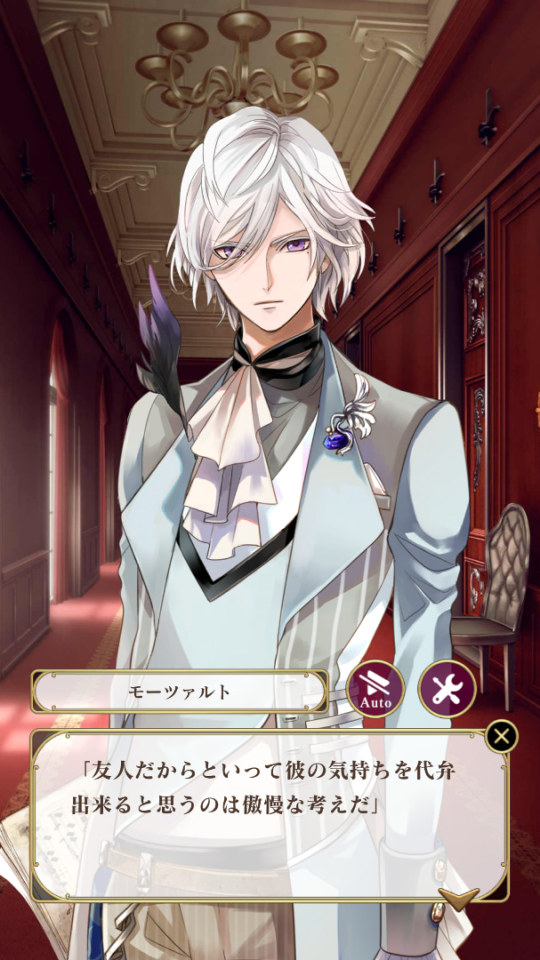
【 Mozart 】 It is arrogant to think that you can represent his feelings just because you are his friend.
He tells her that she should ask him directly or think for herself.
When they arrive in front of Jean's room, Mozart opens the door, pushes the MC's back and forces her inside.

【 Mozart 】 I don't like it when friends are misunderstood, you should talk to him.
The MC tolds Jean what happened, but he didn't seem to want her inside his room.
She says that she was a bit forced, but maybe this is the best way.
The protagonist falls down and a shadow falls on him. When she looks up, she sees Jean's figure there. The eyes that look at the protagonist are as blank as they were that night...
His eyes are like those of a night without light.
At first, the protagonist wants to leave immediately, but then she decides that she will not be able to understand Jean if she doesn’t face him about that night.
Wasn't it obvious, as Napoleon had said, to put the protagonist on her guard? And he did.
(my man really pulled an Arthur huh? 🤦♀️)
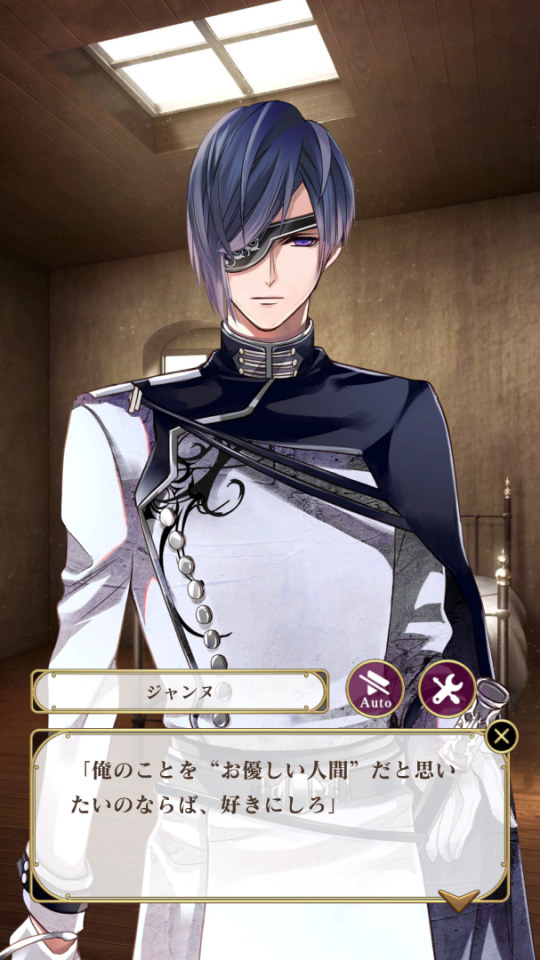
【 Jean 】 If you want to think of me as a nice person, do as you want.
Then Jean tells her to leave.

Like his room, a cold prison cell with nothing but a bed, Jean's mind is closed up tight.
The MC is sad because Jean has rejected her (again). Mozart hears them as he walks back with his shoulders slumped.

【 Mozart】 So it's all a waste of time.
Mozart was hoping that maybe the MC would make Jean open up a little more. Sebastian, however, can't keep quiet about his worries.
For the sake of the ✨beautiful couple✨, Sebastian has a plan.
Mozart looks at Sebastian like he has some ideas in mind but he wants Mozart to leave it to him.
Mozart looks at him like he's looking at some crazy eccentric...lol.

【 Sebastian 】 Mr. Mozart, if you give up now, that's the end of their story! They're done!
He’s all alone and excited about something.
(Sebastian is really something hehe 😂)
Meanwhile...

A single man walks slowly through the chancel, where the moonlight reveals the pattern of the ceiling.
We see the figure of Shakespeare walking through the dark cathedral.
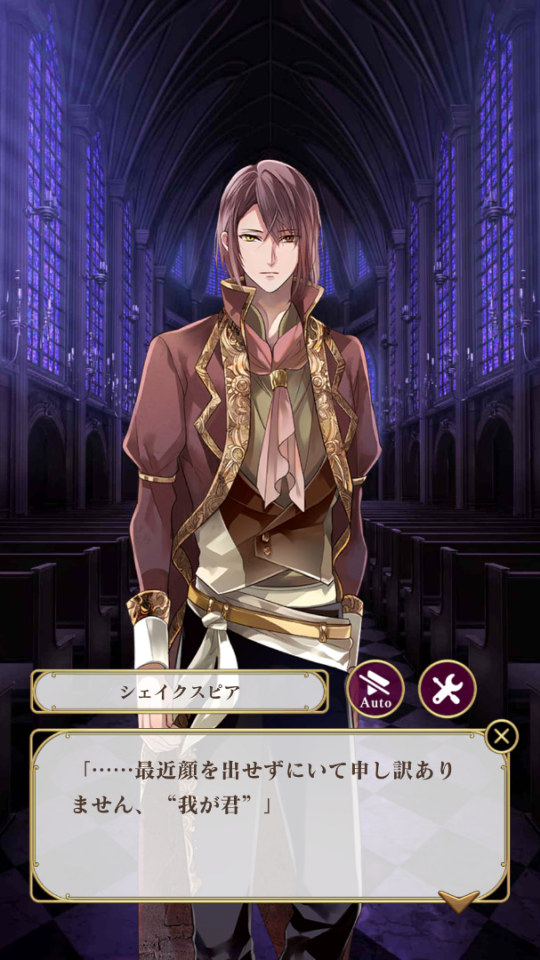
【 Shakespeare 】 Sorry I haven't been around lately, but I'm yours now.
He seems to be talking to someone that he calls “my lord”.
(damn also im soooo jealous that the Japanese server got Vlad’s route as a Christmas present 😩)
Shakespeare called the hero 'impure' when she wandered into the mansions of the great men, fearing that she might get in the way of his plans.
One desires tragedy more than comedy, and there is nothing better than the truth, and one must see many tragedies with one's own eyes and write them down...
That's why he's working with "my lord", says Shakespeare...

【 ??? 】 So the great men are the best Marionettes you've ever seen, dancing on the stage you've set up for them.
Shakespeare seems to want to get some help from such a mysterious person. Is it to create another tragedy? (think we all know the answer 😐)
The next morning, Sebastian's plan is brought to life! He appoints our MC as Mr. Jean's caretaker! But the protagonist can't accept the job, because she is afraid that Jean will feel uncomfortable with her around all the time. Sebastian tells her that Jean is so careless that if she doesn't take care of him, he won't even take some Blanc and might break down.
She then decides to take the job even though she is worried that Jean will reject her again. When she goes to his room, she is immediately told that it is not necessary. However, the protagonist doesn't want to end up not knowing Jean, so she asks him for an arm-wrestling match.
Mmm, isn't that reckless and stupid...? I mean the protagonist seems to be confident, but Jeanne is a vampire man, right? He's also a soldier, right?
If she loses, she promises not to have anything more to do with Jean.
Unsurprisingly, she keeps losing... (yeah no shit)
But she doesn't give up and challenges him again and again.

He may have a pretty face, but I know that he is a man and a soldier who has made his mark in history.
The sun was begging to set down, and the MC was arm-wrestling for the last time.
The MC then shouted something like “Shooting star! Behind the window!”. When the protagonist said "shooting star", Jean was distracted and she won.
That's cheating! But Jean doesn’t react to it, she's too pure. 🥺
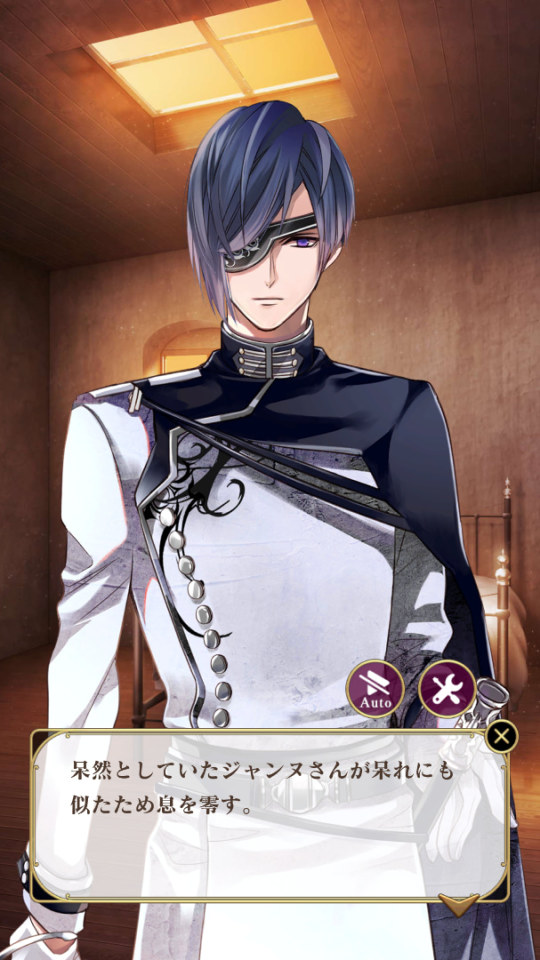
The stunned Jean lets out a sigh of frustration.
The MC now technically won the game and Jean allows her to take care of him. When the protagonist says she won't leave the room until Jean finishes his Blanc, Jeanne gives up and decides to drink it. The protagonist sits leaning against the wall and falls asleep while waiting for him to finish his drink.
When Jean calls out to her, he realises that she is asleep. He looks at her hands, which are red from arm-wrestling. He thinks to himself that she is tough but foolish... It seems that Jean may have changed his impression on our protagonist this time!

【 Jean 】 I'm not such a weak person... I'm sorry.
Now, in this story we technically learn for the first time about the person who gave Shakespeare his strength. Apparently, “that person” had revived other historical figures who served as antagonists in the previous routes.

【 Shakespeare 】 You have the same power as the Count.
He seems to have the same power as the Count.... So he's definitely a pureblooded vampire!
So that’s it for chapter 4!
I hope to be more consistent in the future updates 😣...
#ikemen#Ikemen Vampire#ikemen series#ikemen games#ikemen jean#Jean#Jean D'arc#jean's route#jean route#my translation#IkeVamp#ikevamp jean#jean all chapters#ikemen spoilers
19 notes
·
View notes
Text
Just watched 91 Days
Yet another anime I watch because of the opening song.
A dude wants to get revenge on the mafia family who murdered his entire family 7 years ago by getting close to them and killing them one by one.
If only I didn't have a life to do I'd really binge this in one sitting lmao
I've known this anime exists for years but despite being interested I couldn't bring myself to watch it because I knew this kind of story has nothing but pain yet I'd still get attached somehow and I'd get hurt in the end as the result.
It turns out, this kind of story has nothing but pain yet I still get attached somehow and get hurt in the end as the result.
Your typical mafia gangster revenge criminal show, complete with the all possible cliches of its genre, except in anime format. Seriously, the atmosphere, the soundtrack, the settings, even the logo, all scream “MAFIA SHOW.” I feel like actually watching western gangster show instead of a Japanese anime.
Seriously tho who names the town "Lawless"? Why would any decent person live in a town named "Lawless"??
*Wheeze* I know this was out in 2016 but I can't ignore that one of the main casts looks and acts like FGO's Napoleon but his goddamn name is Nero lmaoo. Thank God he doesn't go umu umu on me.
For all their shortcomings, I like all the major characters. Except Don Orco, fuck that guy. But if you ask me who is my most favorite, surprisingly (or maybe not), it's Corteo. Dude just wants to study in school, not become a mafioso. He's like, normal, if a little bit too meek. I mean, helping your bff who comes back after 7 years with his vengeance but still questioning if it's really worth it is pretty much on the middle side. Not blindly loyal, not self-serving either. Also I can't believe he and FGO's Wodime share the same VA? He sounds so soft and nothing like the latter?? Soma Saito, the range you have...
What do you mean Nero is only 21?? And was only 14 by the time of the Lagusa murders?? He looks at least 25. I like how much of a jolly guy he is that sometimes I wonder how is he a mafia? At least until the second half, that is. "Avilio is like an empty shell. I will find him a reason to live." Wow dude. That's some heavy declaration.
Avilio is... Avilio. Your classic For-Vengeance! anti hero who becomes the very thing he despises but he most likely doesn't care either way.
See, why I was afraid to watch this anime is because I knew the protagonist will get close to the antagonist and they will forge an amazing bond. For the latter, it's genuine but for the former, it's fake. It's just a painful thing to watch when you know from both sides.
On the other side, I love how Corteo-Avilio relationship is portrayed, and unlike Avilio-Nero, I know it's sincere from the both of them and it's just sweet. Their faling out scene is one of my favs too because at that point, they both have had it and it's because they care about each other.
For Avilio, Corteo (and his beer recipe) is both the key to get anyone into his side and a target for the others, so losing him would endanger his revenge goal and whatever sanity he has left, while having him around would be risky and means more work, not to mention the questionings. Corteo himself is worried for Avilio, is jealous of his bond with Nero despite knowing it's fake, and to be fair Avilio involves him in his personal agenda under the pretext of "brotherhood" and is trying to wave everything with money. But it's clear that from the beginning to the end, they are loyal to each other.
Fango is batshit insane and while I love how Ep8 turns out, honestly he is entertaining lol.
Vanno is done so dirty even though I like him a lot.
I love how fucking wrecked Avilio looks after ep 10 and it just doesn't get better. He sure spirals down really fast it's quite eerie.
I did say I got attached and hurt but it wasn't as deep as I thought it'd be.
They should probably dig more of the past of the central characters instead of simply mentioning it. Like say, they could have shown Avilio's life for the past 7 years or how Nero fared with the mafia life given that he wasn't that fond of it but still devoted himself to protect the family pride. Weird, because many other aspects of the casts' characterizations (hobbies, abilities, tendencies, relationships) are usually shown instead of told.
Well following the cliches of the genre, Fio the girl of the family is set up to marry the political rival and after her role is done, she is shipped away. She could have more to do with the plot than this. Even though I like her initiatives to get the brothers work together...
I love religious badass characters because of rule of cool. And in this setting, I can watch them recite prayers, sign cross, go to mass, and I can honestly say "What's all that for? Y'all just gonna commit atrocities again anyway." and I love the irony in it.
I'll never look at lasagna the same way again.
For the kind of revenge story that focuses on how ugly revenge is, I like this show's execution and exploration. There is nothing new, but it plays its cards nicely.
So I was listening to TK on Spotify and Signal is fucking amazing. Its popularity is directly behind the legendary Unravel and Katharsis, even. Then I found out it's actually the op song for this anime, which is what finally spurred me into watching it. The power of a song, indeed.
Tl;dr What do you mean it's been only 91 Days I thought it was an entire year?? They got done in by a guy they've known for just, like, a season??
28 notes
·
View notes
Text
Twitter is not a good place and I have opinions.
Okay so, just visited Twitter to see how they like The Old Guard and please remind to never go there for anything more than artist’s posts and memes.
(This is more of a rant than a cohesive explanation of my thoughts but I won’t lose my time on Twitter for that and I still need to talk about it, so we’re here. Okay, here goes-)
Of course spoiler warning for the whole movie.
"it's bad, it's not creative, it's boring, there's no story apart from bad guys pharma and good guys mercenaries."
Did we watch the same movie?? It's like those Mad Max Fury Road reviews who kept saying "they leave and come back, no plot har har I’m very funny" when the whole point of the movie is about staying where you live and make this place better, not abandoning it because you risk abandoning your true self with the land (amongst other things the movies tries to say).
Yeah maybe the story is a bit seen, pharma and all. But the whole plot revolve around the Old Guards and their emotions. It's about a tired warrior finding hope, and a young immortal finding her place, and how to deal with loss and grief and solitude, it's about finding purpose in helping other because that's what human do, help each other. It's a lot more than fight scenes and bad pharma (which, maybe it's an old trope but it's still very true to this day, please keep portraying pharma CEO as comically bad because they are!)
It's like men can't understand a story unless there's lots of death and unnecessary trauma. Can't you enjoy a story about found family and hope and kindness for one another like everyone else?
Here are the critics I saw, and why I think it’s bullshit, point by point because I’m petty like that:
The characters are flat and two dimensional: I mean, no? Sure, Joe and Nicky are not the center of attention, and we see Booker tired and a traitor, and the human ones are bit glossed over (though we see enough to understand them, Copley and his wife, the scientist that thinks she’s helping humanity, etc.), but Andy and Nile are fully developed? What else do you need?
Andy is a very old, very tired immortal that has a very complicated past (that we see a lot of) and her motivations, state of mind and thoughts are well explained (they all say she’s old, and tired, we know about Quynh; hell, Andy’s first line is about that) and we know she lost purpose, and she finds it within the film! She changes! Her character evolves in interactions to other but mostly Nile. Speaking of her- i know I’m repeating myself but what else do you need to consider a character not flat? She loves her family but doesn’t run to them because she’s not an idiot. She’s a fighter, a marine, a very competent one at that, but she still gets scared by being an immortal, she asks questions, she’s compassionate, she feels! All while being a bad ass fighter. She has agency, makes her own choices and choose her way, she has motivation and she know what she brings to the team and is not afraid of saying her thoughts and needs.
And even Booker and Nicky and Joe have full character, even if shown less. We have Booker’s back story, and we know he cares a lot despite all his hurt (he says he did it to help Andy die, which was still wrong and selfish, but he was genuinely trying to do something because he hurt so much). Nicky and Joe have a softer side, and sure it’s mostly conveyed through their own love story but they hug the other Guards and Nicky brings food for Andy and Joe jokes around (still thinking about that “faster than the elevator” line). Yeah it’s not a deep character study but it’s more than about half action movies today, and it’s enough in the story to make me care about all of them, even Copley. Although a lot of that may come form the actors too.
The fights scenes are bad: apparently they’re boring and do not do justice to the comics. I can’t speak for the last one, but boring? Again, did we watch the same movie? Yeah, there’s no big explosions and fire everywhere and collapsing buildings, but they’re not boring. I’m sorry my tastes are superior but I’d rather be shown the talents of a covert team of immortal warriors though discretion and efficiency. Why would they need explosions when they can juggle swords, axes, rifles and guns so smoothly you don’t even see a shift in their stance? See first fight in South Sudan. Why would I need collapsing buildings when I can have a team of fighters swapping weapons together like nothing? That scene at Merricks’s building where they all reload and change guns and the camera turns around and panel over all of them? That was dope and a very creative way to show how smooth they work together (with Nile added! So way to go to show the new group dynamics.) through a smooth and continuous camera movement. I could go on, but where did you see the boring fight scene. Yes there’s no cool lights and tricks a la John Wick, but if it did they would have complained it was a rip off, so...
The cinematography is bad: Just because it’s more understated doesn’t mean it’s bad. Yes, there’s no neon lights or cool shots like other might have (looking at you John Wick, since everyone seems to compare the two movie) but it serves the story. It’s because it’s so simple visually that you can get into the feelings and story. You don’t look at the light, you look at the actions and the faces. And honestly, I think it suits the Guards better. They look timeless, they fit in everywhere. A photography that’s striped down to the necessary only serves the story. I don’t see them in safe houses with a bunch of lights and modern furniture, just like I don’t see expensive shots and over the top choreography for them. As I said, they’re a covert team, they’re smooth and efficient, I like that the photography align on that and show them in simple shots.
tl;dr: Just because it’s simple doesn't mean it’s bad, sometimes that's what you need to work with the story and its characters and themes.
Not enough story and too much nothing to fill in: I mean, they die 12 minutes in, you get all the stakes, antagonist and themes in like 20 minutes, what else do you need? There’s break in the actions to expose plot and concept, but it never feels wrong or too much of a info dump, it’s fluid and natural because we’re following Nile into the immortal world.
Bad Pharma is Bad: Yeah, let’s talk about that. (Cautions, purely opinions, no real arguments to change someone’s mind here) I don’t care if it’s cliché, not when pharma in the US keep rising the price of Insulin every month, not when pharma all over the world send their faulty medicine to third world country because there’s no one that cares enough there, not when you know they purposefully don’t finance HIV researches because triple therapy gets them a lot of money, not when you hear about the experimentation and how they get their resources and literally everything that I’m not getting into right now. Who cares if they’re show as bad people once again, they are! You think CEO care about anything but money? If it feels wrong in the movie it’s because it is wrong.
Tell me no one in our world would kidnap and torture immortals to find their power. And don’t talk to me about bad representation of CEO and exceptions, I don’t care. One exception doesn’t make all the other suddenly better or worth the wrong they’re doing. So yeah, give me more cliché good guys fight bad CEO, I love it.
They did not use their concept enough: Again, where? To me, they did all they could with that concept, you get all the things you can only get with the concept, interesting and fun one. They are still afraid of dying one day, and even if they’re not (i.e. Andy or Booker) their brand of immortality doesn’t mean they’re not afraid of being captured: the Quynh scene happens literally just before Nicky and Joe are kidnapped exposing us the stake of being immortal, talk about good script work, right? Talking about fun trope: you have the millennium old couple that use to kill each other but now love each other, the classic ennemies to lovers we all love, you have the strategy of using your immortality to your advantage and destabilize your opponent: Nile walking into Merrick’s building and getting herself killed on purpose only to stand again and use the guard’s shock and lack of preparation against them, you have the fun references to real historical figures that comes with immortality: Rodin, Napoleon, etc...
I’ll link to this video I found that talks about this better than me, but basically, they did use their concept, a lot, and well.
The music: I can’t really say anything about that one. Maybe you don’t like the style they used, and that’s fair. To each their own. But it wasn’t too much like other Netflix’s movie (Looking at you 6 Underground. Four (4) song of the same artist in one movie?) but again, it’s Netflix, they use modern songs in their soudtracks, you should expect it. I didn’t bother with the lyrics accuracy to the actions, but each time the music fit well in tune and mood of the scene. And the actual score made for the movie was really good, not too much but still supported the actions and dialogues on screen like it should.
And my favorite yet, we’ve already seen it. I don’t have any smart answer to that apart from I’m sorry you’re a cishet, but found family is the superior trope and I hope you can one day see it too. Who cares if we’ve already seen it, it’s a different flavor! It’s no X-Men flavor, it’s Old Guard flavor and I love it. Have you heard of the Hero’s Journey? How Lord of the Ring, Star Wars and Harry Potter all have the basic same plot? And yet you can like all three of them for different reasons? Because they’re not the same flavors? Well, apply that to the immortal group of fighters and enjoy it.
Okay, that’s most of my thoughts on the film for now, but to make it short: it’s good and those people can’t appreciate good things that are more feelings and humanity than fist fights and nihilism. How dare a movie say we’re good and need each other and not end in a pathetic discovery that all the word deserves to burn.
#tog#nile freeman#andromache the scythian#quynh#yusuf al-kaysani#nicolo di genova#sebastian le livre#kaysanova#andromaquynh#yeah most of the critics were form old dude that can't fathom why someone would feel emotions and seek help#and want to have good people around and help the rest of the world#can you tell i'm salty this fine evening?#it doesn't have to be bourne or james bound or john wick or whatever to be meaninful stfu#em speaks#I have opinions okay and I keep forgetting that Twitter is the sewer of the internet
7 notes
·
View notes
Text
DC Villains: An opportunity for success

Now that Joker is the most profitable comic book movie in history, DC has an opportunity to differentiate itself from the MCU and other studios by focusing on villian origin stories. While the MCU is wonderful, their villains could be utilized better. Out of 23 films, only 6 of their main villains were really memorable to me (this is subjective of course). Standouts include Loki, Killmonger, Hela, Thanos, Ghost and Vulture. These characters were charismatic, intelligent, relatable, powerful and evil. They were worthy adversaries and made the protagonist look great in victory. However, out of those 6 characters, 3 are dead (I'm still holding out hope for Killmonger) and 2 (Ghost & Loki) are reforming.

Presenting compelling villains with well fleshed out back stories will only raise the stock of the DC heroes. For example, if DC were to include Joaquin's Joker in The Batman movie, people would be more invested in Robert's Batman because we are already invested in his antagonist.
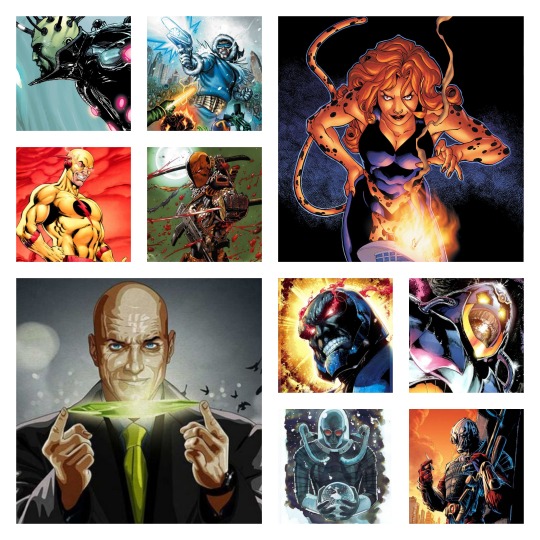
DC seems to be heading in the direction of producing villain focused movies as Black Adam begins filming in July 2020, and if The Birds of Prey is successful, a Gotham City Sirens spinoff is expected to be the follow-up.
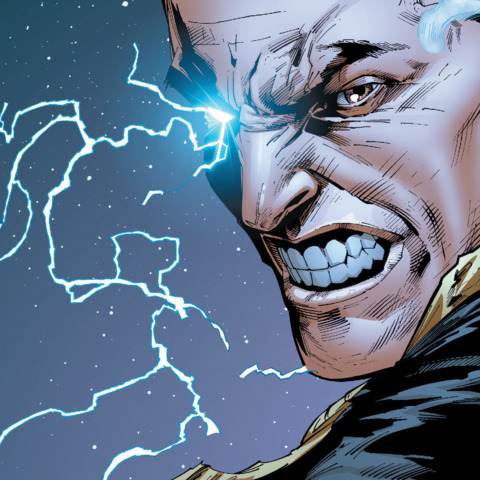
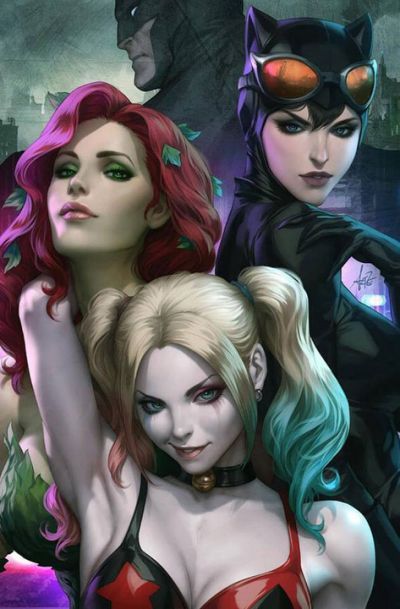
If DC were to truly commit to supervillain movies moving forward, here are three villains I feel can carry an amazing solo film:
Vandal Savage
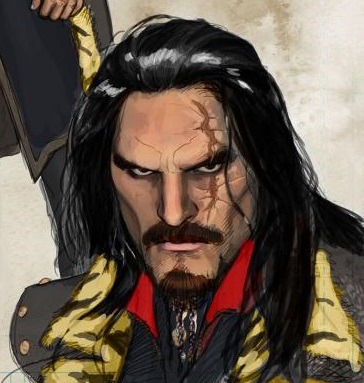
Vandal began his days in 50,000 BC, as a caveman named Vandar Adg. He was bathed in the radiation of a mysterious meteorite, which gave him incredible intellect and immortality.
He claims to have ruled hundreds of civilizations under hundreds of names: Khafre, Cheops, Alexander the Great, Julius Caesar, Genghis Khan, Blackbeard, and Vlad the Impaler, to name a few. He also terrorized Victorian era London as Jack the Ripper. He has also worked as close friends and advisers to the likes of Erik the Red, William the Conqueror, Napoleon Bonaparte, Otto von Bismarck and Adolf Hitler. He also led the Spanish Armada in its attempted invasion of England (suggesting he may have been Alonso Pérez de Guzmán). He was the court physician in France and even used the royal family for syphilis experiments.
Basically there are a lot of intriguing stories you can tell with Vandal and if you build him up in a solo film(s), the hero who defeats him will look all the better for it.
Ra's Al Ghul
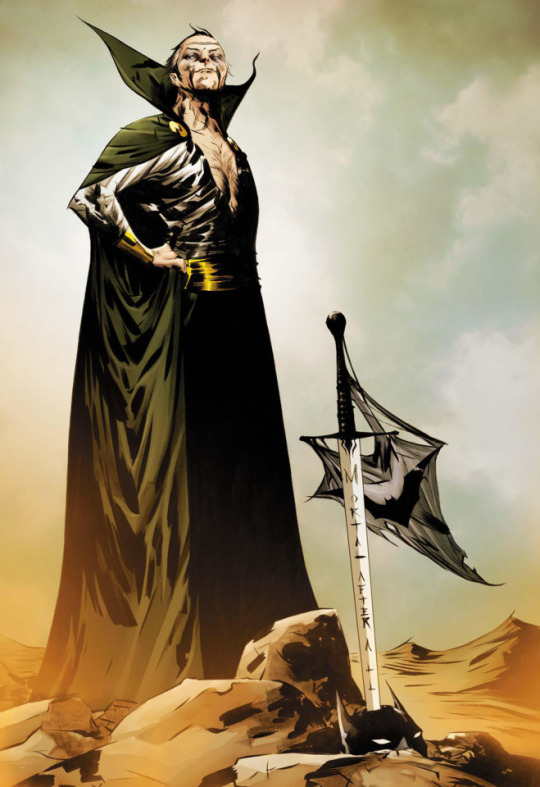
Like Vandal, Ra's has been around for centuries but where Vandal is just a sadistic savage, Ra's is a hero in his mind.
According to Birth of the Demon, Ra's al Ghul was born over 600 years to a tribe of Chinese nomads settling in the desert somewhere in North Africa. He developed an interest in the sciences at an early age and abandoned his tribe to live in the city where he pursued a life as a researcher.
Using Lazarus Pits to extend his life, Ra's spends the next several centuries journeying the world. He fights in the French Revolution and the Napoleonic Wars, becoming a formidable warrior. As the world entered the modern age and industrialisation began to cover much of the Earth, Ra's grew to despise humans, who he believed were destroying the world's natural beauty, setting him on a path of eco-terrorism.
Sinestro
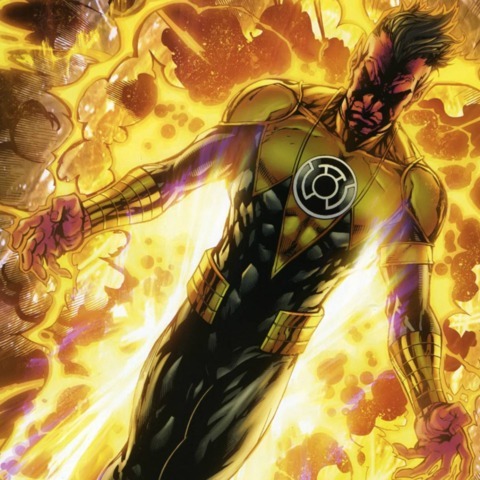
Sinestro was born on the planet Korugar in space sector 1417. His dedication to preserving order originally manifested in his previous career, an anthropologist specializing in reconstructions of ruins of long-dead civilizations. One day while he was on one such site, a Green Lantern named Prohl Gosgotha crash-landed into the site, injured and apparently dying. He quickly gave his ring to Sinestro, just in time for Sinestro, who barely even understood what the ring could do, to defend himself from the Lantern's pursuer: a Weaponer of Qward; however, Sinestro had to destroy the ruins he had spent time restoring in order to crush the Qwardian. Afterwards, Gosgotha turned out to still be alive and asked for his ring back to keep him alive long enough to get help. Sinestro, knowing this would mean not being a Green Lantern himself, instead let him die and took over his post. The Guardians were unaware of his actions.
Sinestro began using the power of the Green Lantern to instill fear rather than combat it and the Guardians banished Sinestro to the antimatter universe, a counterpart to the "real" universe made up of "negative matter". Sinestro believed himself to have been wronged by his former masters and now hated them. Creating a yellow power ring for Sinestro to use, the Weaponers sent him back to the "positive matter" universe to seek his revenge. Sinestro quickly became the Green Lantern Corps' most powerful nemesis, partially due to a weakness in their power rings that prevented them from directly affecting the color yellow.
The more successful the villain, the more successful the picture. - Alfred Hitchcock
Which villains would you like to receive a solo film?
-Villain biographies from wikipedia
#dceu#dc#dc comics#marvel comics#marvel#mcu#joker#hela#erik killmonger#thanos#ghost#vulture#loki#vandal savage#ras al ghul#sinestro#black adam#gotham city sirens#harley quinn#catwoman#poison ivy#lex luthor#cheetah#brainiac#mr freeze#deathstroke#dc zoom#darkseid#captain cold#deadshot
30 notes
·
View notes
Note
Hello! Thank you so much for all the work that you guys do! If I may ask..... Do you guys know who is the UL for all the released vamp routes?
Hello! Thank you for your kind words, we’re all working very hard to keep up with Cybird ^^I’ll be putting the reply under the cut as to prevent spoilers, since this involves discussing routes that haven’t been released in ENG yet.
Even though IkeSen has some pretty obvious ULI (”unrequited love interest” for those who aren’t familiar with this abbreviation), from IkeRev on, they get a lot more subtle.
I’m going to list the ULI that we’ve come to a conclusion on upon discussing and reviewing our screenshots, but honestly speaking, there are some routes were the ULI is very obvious, and some routes where they are Not, but overall they’re quite subtle.
Overall, it seems to follow the standard pairing within IkeVamp! These pairings can be seen in the [Sucking Blood Triangle] event, and repeats a lot when there are 3P events.
Napoleon’s ULI seems to be Sebastian, this seems to be accurate in the ENG version as well, but, well, it’s difficult to tell if he’s an ULI for Napoleon or MC lol
Mozart, Leo, and Arthur’s ULI’s are too subtle too tell, aka none of us have an idea what they could be. There are hints here and there, but nothing concrete enough that can be a true ULI.
Isaac’s ULI is Dazai, but surprisingly, his ULI “moment” comes later in the route at about 5 days before MC is supposed to return to the future. He mentions that he’s both happy for and jealous of Isaac as MC is going through such lengths for Isaac, but then glosses over the topic when MC asks him to clarify.
Vincent’s ULI is Shakespeare! We like to joke that Shakespeare is the murderous chaotic bi that every harem needs because he is not subtle about being the ULI at all. He quite literally does the typical yandere “if I can’t have them then no one will” line of thinking and then tries to kill MC because he likes both Vincent and MC. Peak chaotic bisexual, what an Icon.
Theo’s ULI is Arthur, and he’s quite bitter about it. In Theo’s route, he makes a few attempts to seduce MC as well as convince Theo to let MC go and return to her timeline. This then turns into Theo and MC “breaking up” at around chapter 19 with an entire bittersweet sex scene too. They later get back together though, all is good!
And then for Jeanne, the most recent route, his ULI is Mozart. Which is honestly really sad because Mozart does such a good job of being a wingman for Jeanne and even gets his hand hurt trying to protect MC. During the period when MC and Jeanne were struggling with their feelings and Jeanne was distancing himself, Mozart stands in as a protective and caring figure for MC while both supporting Jeanne and making it clear that he’s ready to quite literally take Jeanne’s place in MC’s heart if Jeanne doesn’t stop being angsty. Poor Mo-kun
—
(JK the true ULI are the route antagonists outside of Shakespeare because all of them are hella gay for the suitors. Like seriously. Hooke was super gay for Isaac. Gilles tried to pull a kill-then-suicide with Jeanne. Ikemen Scorned Lovers, as we lovingly refer to Ikevamp.)
66 notes
·
View notes
Text
TMNT S02E08 - Invasion of the Punk Frogs
Admit it. That title alone makes you curious.
So it starts with Michelangelo evading lasers, trap doors, and grabby metal hands. Where the hell does Donatello get the sheer amount of equipment needed for this kind of thing?
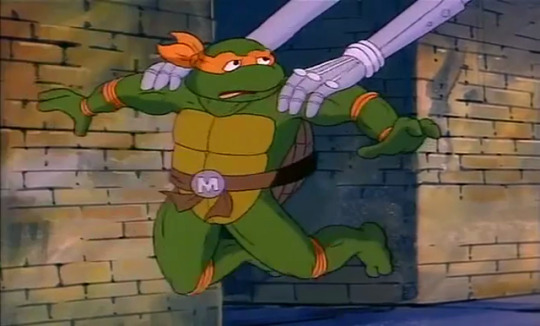
But at the last minute he’s washed back by a flood of water. It turns out this was a timed obstacle course, which each of them are doing in turn.
And then Splinter says something really weird: “All indications are that [Shredder]’s planning to return with the Technodrome.” What indications? Did they just try to handwave foreshadowing into my face? I don’t remember that coming up before.
Not to mention you’d think Krang wouldn’t be in any hurry to return. I mean, he was pissy on Earth because he’d been banished from his home dimension, and now he’s back where he wanted to be. He seemed pretty happy about the situation at the end of last season. Why would he bring the Technodrome back to Earth?
Anyway, Shredder calls Krang up to announce that he has a new Plan O’ The Week, and this one will really work, unlike all the others, so there. His plan is to create more mutants to attack the Turtles and... second step something something, third step profit.
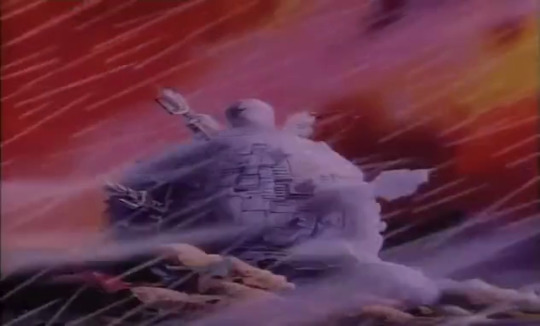
The problem is that the Technodrome is in the middle of an ion storm, which is presented as being just a thunderstorm. Shredder insists that this absolutely can’t wait and they have to risk sending through the mutagen... um, why? Is there a reason this plan can’t wait until tomorrow?
So we cut to a camper RV in the middle of a swamp, and a couple who are probably going to be arguing about their vacation for the next few months.
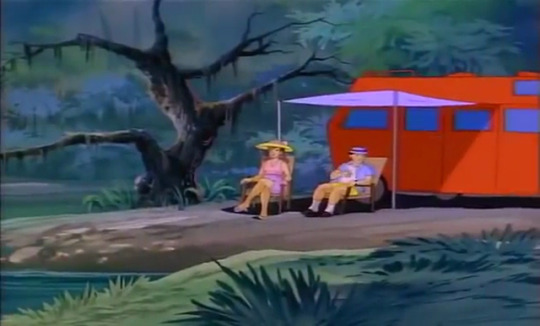
I can see why. I’d lambast any spouse o’ mine who took me on vacation to a swamp. What are you supposed to do there, attract leeches?
The couple’s son is keeping himself occupied, though, having found four frogs that he wants to keep as pets. Mom is grossed out and orders him to put them back where he found them.
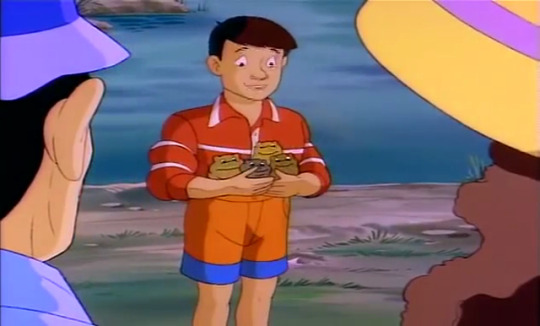
Just then the canister falls out of the portal, cracks open and starts leaking into the water. Guess what the frogs come into contact with as soon as the boy drops them.
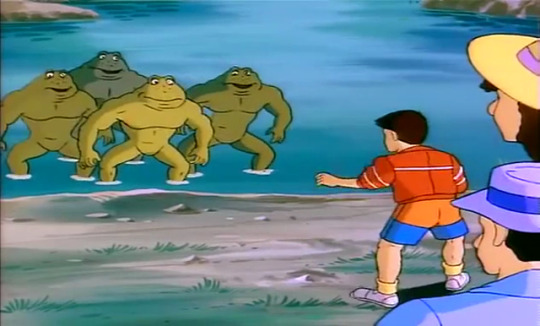
Krang informs Shredder about this fuckup due to his impatience, and Shredder decides to go to Florida. Um, how? I mean, is he going to drive, or take some form of commercial transportation? Rocksteady and Bebop are left in NYC to distract the Turtles from.... um, Shredder not being there.
The Turtles hear about giant frog-mutants, but aren’t able to investigate due to Bebop and Rocksteady generally causing mischief.
Shredder has somehow teleported to Florida, where he finds the canister completely empty and four giant talking frogs. He pretends to be a nice person to get the frogs on his side, gives them holographic clothes (?!), and claims they’re going to be battling the evil Ninja Turtles.
He recalls Rocksteady and Bebop, and introduces them to the frogs: Napoleon, Attila, Genghis and Rasputin. Only Napoleon looks kind of worried about this, ironically.
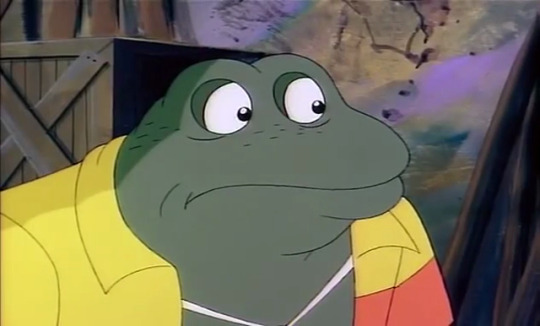
Bebop rather logically points out that as trained ninjas, the Turtles won’t have any trouble defeating the frogs. Shredder dismisses this by saying that he’s personally trained them... wait, what? This can’t be more than a day or so after he found them, and he presumably spent most of that time getting back to New York.
Are we really supposed to think that he can turn them into good fighters in the space of a single day? Because watching any iteration of TMNT requires a lot of suspension of disbelief, but that pushes me too far.
It also raises again the question of how long the Turtles have been mutants. If you remember, they mutated from tiny turtles right into their teen forms in the first episode, so... does that mean Splinter was just really fast with their training, and they’re not actually teenagers?
The Turtles are eating again when April tips them off to a report on four green robbers described as looking like giant turtles. Um, the frogs really don’t. They really don’t. They look like frogs.
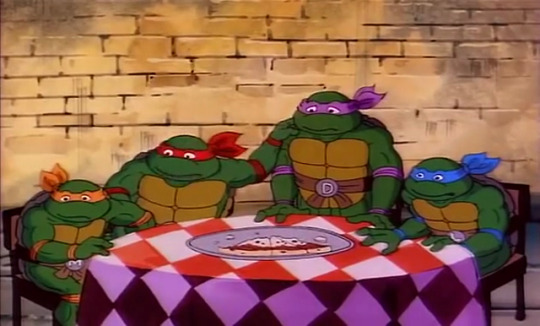
The mayor starts ranting about how the Turtles have terrorized the city, even though the only “terrorizing” I can remember was from some dorks in costumes. Then again, he IS a politician. Jump on an issue to be seen doing something, and don’t let pesky facts get in the way. So he’s created an anti-Turtle squad to hunt them down, with Max Headroom in charge.
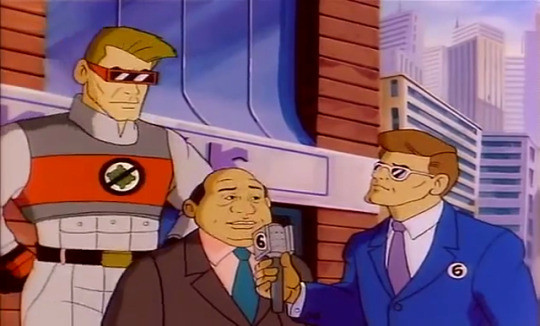
The frogs seem awfully cheerful about the idea of taking over the city, which I guess is naivete in action. I mean, they don’t know that such things are bad, and you can frame almost anything as being good if you want.
Shredder wants more mutagen, but Krang confirms that he already sent him the last. Yes, impatience really got you a mutant army, Shredder. But Krang is apparently in a generous mood, because he will tell Shredder the recipe for making more.
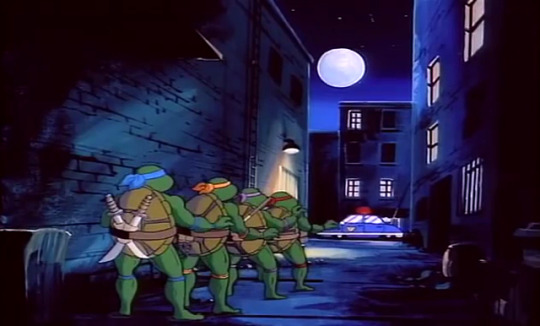
The Turtles, meanwhile, are being hunted down whenever they show up on the surface. It’s funny that the most effective part of Shredder’s plan was actually the part he didn’t plan.
The Frogs show up at a chemical warehouse to steal some stuff, where they debate the morality of what they’re doing.
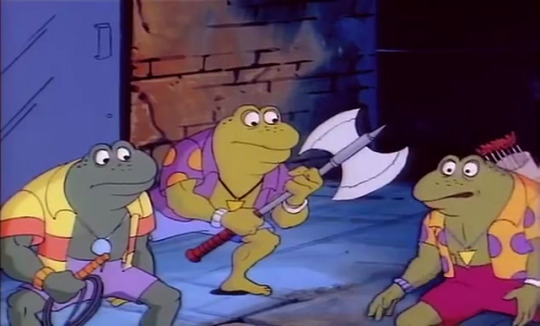
The Turtles are tipped off about it and somehow get to the chemical plant in the next couple minutes to stop the frogs in mid-heist. Did the frogs stop for dinner before looking for the chemicals? Space is warped and time is bendable!
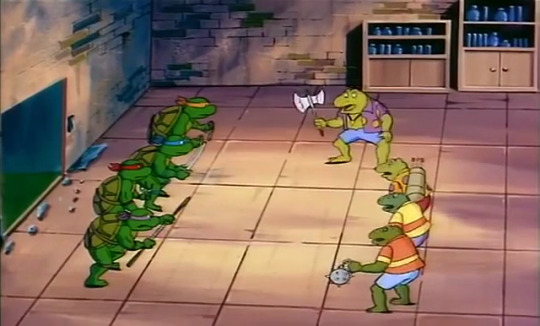
But the frogs manage to escape using a flash-grenade-arrow.
“I’m insulted! How could anyone mistake those... things for turtles?” Good question. They look like frogs.
Donatello immediately figures out what the stolen chemicals are for, and says that they need another one to finish the mutagen. Don’t ask me how he knows this. He’s the designated know-it-all.
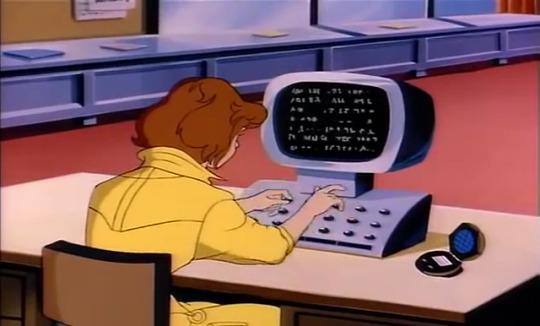
Yes, April has extensive database information on chemical shipments... on a 1988 computer. At a news TV station.
Oh, and because he’s a troll, Krang didn’t mention the last ingredient to Shredder before... just to be a dick. Seriously.
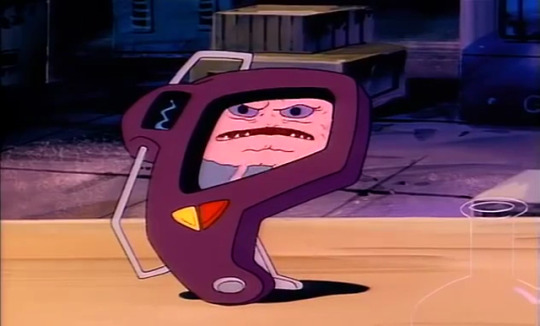
And he also knows where the shipment of the chemical will be... even though he’s not even on the same planet. Where do people get this information?
Shredder’s also starting to lose the frogs, who want to know why they can’t try to reason with the Turtles instead of just killing them until they’re dead. Shredder obviously does NOT want that to happen.
Meanwhile, April covers the anti-Turtle squad and their giant freeze-ray-equipped tank.
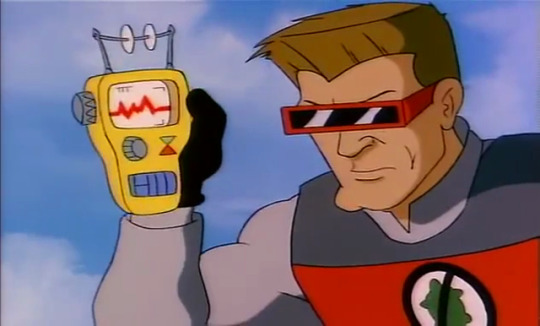
“This tracking device is tuned to their biorhythms.” Wait, what? How the hell did you get those?!
The Turtles intervene when the frogs rob the chemical shipment, but before anything more serious can happen, the anti-Turtle-squad shows up and demands they all surrender. And by “surrender,” I mean stand still so they can be frozen solid.
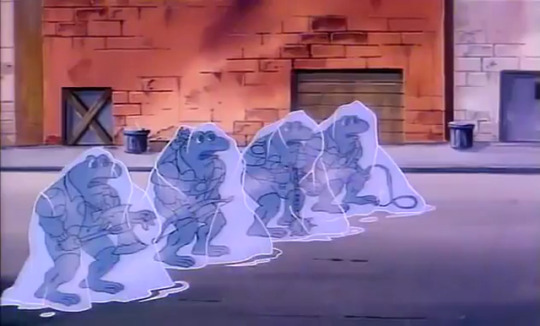
Fortunately Raphael knocks away the nozzle, and giant chunks of ice end up falling on the tank. These soldiers are clearly the best.
Leonardo says that they have to bring the frogs with them, because they’re also mutants, and they can’t let Captain Hoffman have them. Donatello and Raphael take some convincing, but they eventually come around to his way of thinking.
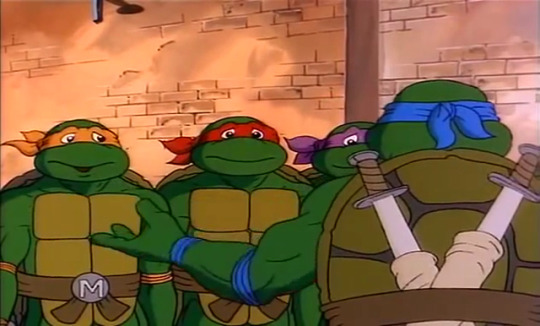
So they each grab a frozen frog and head into the sewers.
Splinter says that they have to win the frogs over with a show of trust, and first by melting the ice. Apparently being frozen solid is something you can get over in a matter of seconds if someone blows steam on you.
The frogs freak out and prepare to attack, but Splinter orders the Turtles to disarm, and tells the frogs that they can leave if they want. Might have been a good idea to not actually bring them to your home before that. The frogs finally realize that Shredder has been using them, and once again Leonardo has an idea.
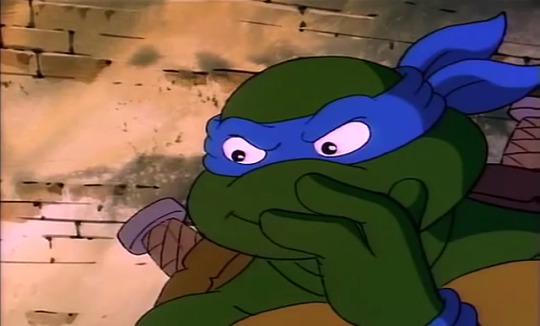
Which he starts whispering to nobody in particular.
So back at Shredder’s current base, the frogs say that the Turtles got the chemical shipment and are going to hide it at the closed-down Stonewall Prison, aka Alcatraz.
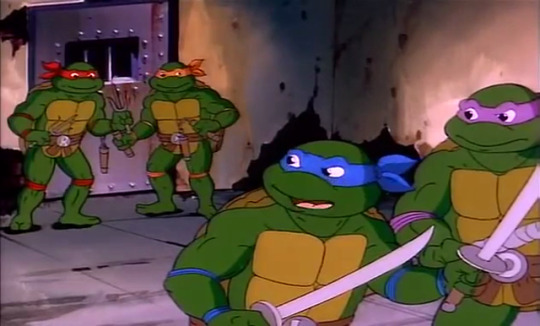
Of course, it’s all a trap and the Turtles are lying in wait for Shredder, who figures out immediately that the frogs were involved in this scheme.
But before any kind of fight can break out, the anti-Turtle squad shows up. No, I have no idea how they knew to come here, since there’s nobody at the prison to tip them off, and Shredder was the only one to be told where the Turtles would be.
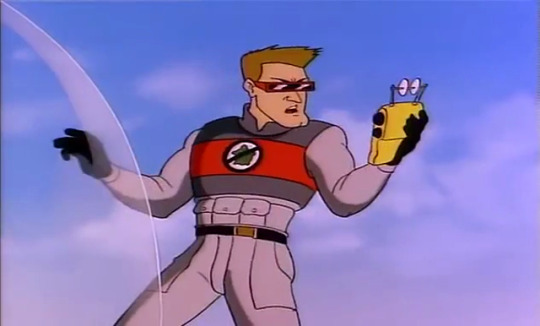
Oh right, the bullshit tracking device that will be inexplicably dropped after the next few scenes. Really, if it were that easy, wouldn’t Shredder have found out where they live by now?
So Shredder whips out a crystal ball and holographically projects some squad uniforms on himself and his two mutants, before running out to leave the turtles and frogs in the lurch.
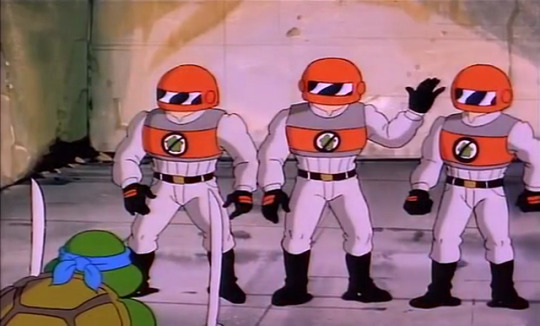
The anti-Turtle Squad throws knockout gas at them as they run... which somehow doesn’t affect them despite the lack of gas masks...
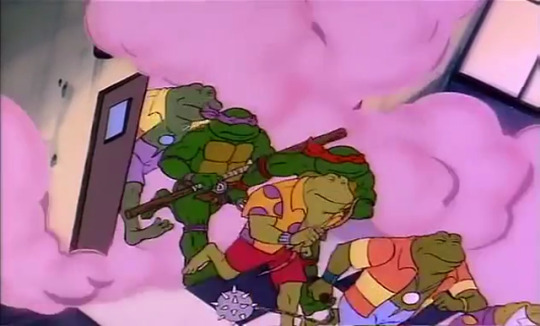
and the mutants make their way into the prison laundry room. The Turtles are having trouble staying conscious, but fortunately Rasputin still has his Green Arrow quiver and is able to blast a giant hole in the floor for them all to escape through. Captain Hoffman is defeated, his bullshit tracker never comes up again, and the whole subplot just kind of fizzles out of existence.
The Turtles say goodbye to the frogs, Michelangelo offers them a pizza only to get epicly rejected, and I have to wonder when in the last few days the frogs even tried pizza in order to hate it. Also, Splinter looks like he’s plotting revenge.
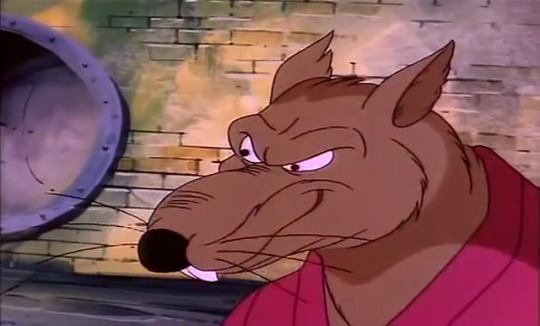
VERDICT
This one goes under the listing of “pretty good, but not great.” The biggest problems are the excessively fast training of the frogs, who become a threat to the Turtles in under a day, and the go-nowhere plotline of the anti-Turtle squad. I actually really like the idea, but it’s simply brought up and then dropped, when it could have made for a good secondary antagonist force in future episodes, especially since the mayor is unlikely to just decide the Turtles aren’t a problem because the episode ended.
The story itself is a pretty straightforward one, but it does have a lot to do, including introducing the Punk Frogs and bringing about their eventual about-face. I liked that their big issue was naivete rather than just being bad or good; they literally didn’t realize that someone could lie to them if they seemed nice, sort of like small children. They could have done a bit more questioning when Shredder was acting obviously evil, but overall it was a good take on the perils that would be faced by animal-originated mutants, and it even makes you wonder how the Turtles would have turned out if they had been with someone who wasn’t good like Splinter.
And of course, the door is left open for what other mutants might come out of Florida (hint hint) since presumably other animals down there would come into contact with the mutagen.
Krang, of course, remains a wonderful troll.
GRADE: B
5 notes
·
View notes
Text
Doyle’s The Parasite and s4

This little non-Sherlockian, paranormal gem, published in Harper’s Weekly starting in November 1894--that’s right, a little less than a year after Doyle published The Final Problem (November / December 1893)--deserves our attention. When @longsnowsmoon5 pointed it out a week or two ago, a few of us shouted about it a bit, but we didn’t really dig deep with it. Since then, I’ve re-read it twice, and boy howdy.
In case you’re not familiar, here are some plot elements to whet your interest:
a skeptical physiologist (Austin Gilroy) who allows himself to become a subject in a mesmerism / mind control experiment
a woman with mind control abilities (Miss Penclosa) who is generally unimpressive and walks with a crutch, but is surprisingly powerful
two people about whom Gilroy cares--his fiancée Agatha and his colleague, Charles Sadler--who are also both mesmerised (to offer some comfort to more tender readers of this meta, I read both Agatha and Charles as Sherlock equivalents when translated into the BBC Sherlock narrative)
obsession--specifically, Miss Penclosa’s desire to seduce Gilroy
supernatural mind control abilities that cause Gilroy to behave erratically, cause missing time, and, eventually, make him do things he would never otherwise do, some of them criminal
narrative bonus feature: the story is told from Gilroy’s perspective, in the form of his journal entries
(I recommend reading it at Gutenberg because there is much more to it of interest than I’ve been able to cover in this meta.)
Sound like it might, maybe, have some relevance to s4? I think it does, especially in terms of figuring out what the fuck is happening to both John and Sherlock.
Reading s4 through the code of The Parasite may help explain Sherlock’s sudden propensity for intuition / premonition, and John’s erratic behaviour. Ultimately, including The Parasite as one of the many intertexts of s4 offers a great deal of support to readings like @jenna221b‘s theory about Mary manipulating John using TD12, which in turn adds support to the ever growing pile of evidence that Mary is a villain (thanks to @teaandqueerbaiting for that monster post). It also informs readings of Mary as femme fatale and the Woman in Green (femme fatale thread by @inevitably-johnlocked, Woman in Green addition by @deducingbbcsherlock). Although I’m not sure mofftiss should ever be let off any hooks for s4, this reading might offer John fans (myself included) a much needed opportunity for a more positive reading of John in this series.
Details under the cut.
Although the fandom as a whole has put its finger on a massive number of movie intertexts for s4, many of which seem to have unduly influenced this series, especially TFP, The Parasite is, to my mind, the standout literary intertext, for two reasons:
First, it represents one of Doyle’s dips into the “strange tale” / paranormal / horror genre. Given the general bent of s4 away from the detective story genre and toward something uncanny / weird tales-ish / disturbing, The Parasite seems a more likely fit with s4 than the stories from which the series borrows its titles: The Final Problem, The Six Napoleons, and The Dying Detective. With s4′s final revelation of Eurus as the ultimate antagonist of the series (although I read that revelation as hallucinatory), it points very directly to the themes of The Parasite.
Second, specific features and key plot points of The Parasite are echoed in series 4 character / plot / thematic developments. These serve as an interpretive aid in understanding what the hell, exactly, happened in s4, to very, very interesting effect.
A Study in Genre Hopping
One of the major disappointments / wtferies / cause of mass despair of TFP, and s4 in general, was the apparent sudden switch in genre. Sherlock Holmes, although in this incarnation an astoundingly sensitive fellow, has always been the centre of stories that stuck to a certain rational, materialist, logical ethos. If you can think clearly enough, and know the right facts, you can understand the world around you. Almost sort of comforting, right?
Well.
This series offered us a Sherlock transformed--into a really, really, kind, good man, which, YAY!--but also into a sort of intuitive soothsayer. The show even went out of its way to signal the turn away from Sherlock’s deductive methodologies, quite early, in this moment in TST, as Sherlock is deducing this client, and explaining how he’s arrived at his conclusions:

KINGSLEY: Sorry. I-I thought you’d done something clever. (Sherlock’s head turns towards him.) KINGSLEY: No, no. Ah, but now you’ve explained it, it’s dead simple, innit?

Excuse you, Kingsley.
Meanwhile, Sherlock is intuiting stuff all over the place, like in this moment in Mycroft’s office:

SHERLOCK (thoughtfully, looking off to one side): There’s something important about this. (For a few moments, the reflection and sound of dark blue rippling water seems to surround him.) SHERLOCK: I’m sure. Maybe it’s Moriarty. Maybe it’s not. But something’s coming. (The water disappears. Mycroft frowns and leans forward, folding his hands on the desk.) MYCROFT: Are you having a premonition, brother mine? (Sherlock blinks and looks towards Mycroft.) SHERLOCK: The world is woven from billions of lives, every strand crossing every other. What we call premonition is just movement of the web. If you could attenuate to every strand of quivering data, the future would be entirely calculable, as inevitable as mathematics.
This series emphasizes, from the beginning, the idea that we’re not in the land of deduction any more. Something else is at play, something that can only be arrived at through following intuition:


JOHN: Now what’s wrong? SHERLOCK: Not sure. I just ... ‘By the pricking of my thumbs.’ JOHN (scoffing sarcastically): Seriously? You?! SHERLOCK: Intuitions are not to be ignored, John. They represent data processed too fast for the conscious mind to comprehend.
We never quite seem to discover what these intuitions might be trying to say, not really. The Thatcher busts continue to give Sherlock the heebie jeebies. They lead him to AGRA and Ajay, and Mary’s past, a series of events that ends in Mary’s death (“Mary’s” “death”). We never really get a sense of why the Thatcher busts give Sherlock these intuitive hits, or why that water effect happens when he looks at them, or. (They are surely not geniune premonitions. They are something else.)
As beginnings go, I think that it could actually have been an interesting setup to something or other. One of the best things a writer can do to a character is take away their usual method of doing things and plunge them into an unknown territory. And Sherlock is clearly lost. Something is not right with him. He’s in some kind of altered state. But what does it all mean?
If we follow the throughline offered to us on a textual level in s4, all of this means, apparently, nearly getting murdered in a truly weird hospital room, and ending up on Horror Movie Mashup Island for some hijinks with the plot device secret sister that literally no one cares about. Not exactly the payoff one might hope for, is it?
In times of textual failure, it pays to follow the subtext, however, and, in this case, the intertext, because this is where The Parasite comes in--at least, I think it does. We are, at least, on the level of the text, in hinky jinky supernatural territory, from the beginning of the series--or at least, things are presented that way. (They are not really that way, but I’ll get to that in due time.)
A Nefarious Plot
Back to plot of The Parasite. The story starts when the main character, Austin Gilroy, gets roped into attending a party thrown by Wilson, a wacky eccentric academic who is all wrapped up in pursuing the brand spanking new field of human psychology (ahhh...the state of science in the late 19th century). Wilson has decided to start by pursuing the most out there phenomena he can find: specifically, cases of extreme mesmerism. He thinks he’s found the perfect practitioner in Miss Penclosa, who humblebrags her way into Gilroy’s attention, and, essentially, challenges him to pick anyone in the room for her to influence, by way of demonstrating what she can do.
Miss Penclosa claims to have extraordinary powers of exertion over others--powers that depend, she asserts, not on anything known to science, but on her ability to extend her will into whomever she chooses. Gilroy picks his fiancée, Agatha Marden, believing that she’s strong of mind and unlikely to be influenced. Miss Penclosa puts her in a trance, and whispers in her ear--

--oopsie--
--Miss Penclosa whispers in Agatha’s ear, and all is well.
Until the next morning, when Agatha turns up at Gilroy’s house and tells him their engagement is over. She offers no further explanation, simply assures him that they’re finished, and she leaves.
Gilroy discovers it’s all part of the demonstration; half an hour later, Agatha doesn’t remember breaking up with him, and the engagement is still on. But, in an excessively creepy moment, Gilroy asks Miss Penclosa if Agatha would have killed him if she’d programmed her to, and Miss Penclosa agrees, yes, she would.
In fact, Miss Penclosa affirms that she has only scratched the surface of revealing her abilities. She has “further powers.” He, of course, wants to know more. She replies:
"I shall be only too happy to tell you any thing you wish to know. Let me see; what was it you asked me? Oh, about the further powers. Professor Wilson won't believe in them, but they are quite true all the same. For example, it is possible for an operator to gain complete command over his subject— presuming that the latter is a good one. Without any previous suggestion he may make him do whatever he likes."
"Without the subject's knowledge?"
"That depends. If the force were strongly exerted, he would know no more about it than Miss Marden did when she came round and frightened you so. Or, if the influence was less powerful, he might be conscious of what he was doing, but be quite unable to prevent himself from doing it."
"Would he have lost his own will power, then?"
"It would be over-ridden by another stronger one."
"Have you ever exercised this power yourself?"
"Several times."
This sort of wildly successful, wide-ranging mind control, is, of course, familiar from TFP:

GOVERNOR: Everyone we sent in there; it-it’s hard to describe. (John turns as the governor continues.) GOVERNOR: It’s ... it’s like she ...
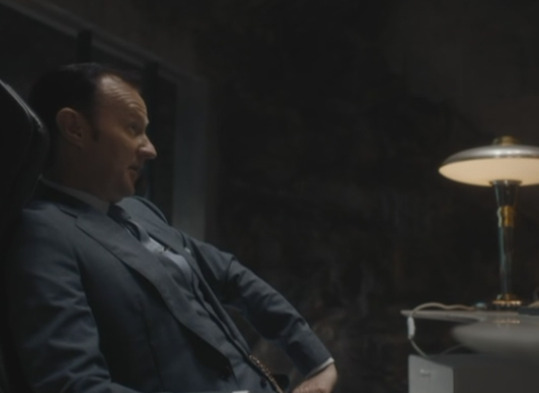
MYCROFT: ... recruited them.

SO! So far we’ve got mind control powers, people under the influence of mind control powers, and those same people doing things they would never normally do. It’s enough of a connection, especially with Murder Mind Control Island TFP, to argue that The Parasite is at work in s4. BUT GUESS WHAT? IT GETS BETTER, IN THE SENSE OF MUCH MORE SCREAMINGLY RELEVANT.
It gets better because Gilroy’s narration, through his journal entries, in addition to some implications of missing days / time fuckery throughout the story, offers a first person description of what it’s like to be under the influence of Miss Penclosa. He describes not being able to help himself, but, once she decides to use her mojo as a tool of seduction, Gilroy holds hands with her, and spends time talking about how boring Agatha is, in comparison with Miss Penclosa. He tries to resist, and Miss Penclosa’s influence only deepens. He decides that, at all costs, he’ll never go anywhere near her again. And yet, when the evening rolls around and their usual meeting time comes, he finds himself simply and irresistibly drawn to her.
So, he locks himself in his room and slides the key under the door. When the moment for his standing appointment comes, he finds himself on the floor, trying to reach the key with a quill pen. This is how he describes what he feels:
It was all wonderfully clear, and yet disassociated from the rest of my life, as the incidents of even the most vivid dream might be. A peculiar double consciousness possessed me. There was the predominant alien will, which was bent upon drawing me to the side of its owner, and there was the feebler protesting personality, which I recognized as being myself, tugging feebly at the overmastering impulse as a led terrier might at its chain.

(Gilroy compares himself to a dog, and others compare him to a dog, so many times, I lost track.)
Most striking of all about The Parasite is what happens when Gilroy confronts Miss Penclosa, telling her that he finds her disgusting:
The very sight of you and the sound of your voice fill me with horror and disgust. The thought of you is repulsive. That is how I feel toward you, and if it pleases you by your tricks to draw me again to your side as you have done tonight, you will at least, I should think, have little satisfaction in trying to make a lover out of a man who has told you his real opinion of you. You may put what words you will into my mouth, but you cannot help remembering--
I stopped, for the woman’s head had fallen back, and she had fainted.
Mary is no fainter (I mean, idk, maybe faking your death is a type of fainting), but John certainly makes a move toward rejecting her in Morocco:

MARY: I always liked ‘Mary.’

JOHN (smiling): Yeah, me too.

JOHN: I used to.
Gilroy’s repudiation of Miss Penclosa triggers an endgame, in which she causes him to do increasingly terrible (and out of character) things that threaten to ruin his life. She goes after his career first, making him interrupt his own lectures at the university with gibberish. He becomes a laughingstock--people start attending his lectures to see what bizarre things he’s going to say next.
The university suspends Gilroy’s lectures, deciding that he’s not mentally fit to run classes, effectively taking his career away from him.
Has something similar happened to John? It’s certainly implied in TLD:

NURSE CORNISH: You involved much? JOHN: Sorry? NURSE CORNISH: Um, with Mr Holmes – Sherlock and all his cases?

JOHN: Uh, yeah. I’m John Watson. NURSE CORNISH (looking as if that means nothing to her): Okay. JOHN: Doctor Watson.

NURSE CORNISH: I love his blog, don’t you? JOHN: His blog?
...
JOHN (interrupting): It’s my blog.

SHERLOCK: It is. He writes the blog. NURSE CORNISH (to John): It’s yours? JOHN: Yes.

NURSE CORNISH: You write Sherlock’s blog? JOHN: Yes.

NURSE CORNISH: It’s ... gone downhill a little bit, hasn’t it?

I can’t think what the hell would fuel this exchange, unless the blog has genuinely gone downhill (you guys, I miss the blog), or Nurse Cornish is in on the whole gaslighting / manipulation / mind control deal (extremely possible, as implied by her position in front of a big hairy grinning yikes worthy head shot of Culverton Smith). Since the blog has stopped, or whatever is actually (”actually”) happening, it’s impossible to check and see if the blog really has gone downhill. If we take The Parasite as an intertext, however, we could certainly imagine John’s writings, and his sense of self, deteriorating as a result of the forces that are manipulating him.
Things take a turn for the extremely disturbing when Gilroy thinks he has found an ally in Charles Sadler, a friend and colleague. [I’ll just say here that this is the bit that convinced me that Mofftiss are cribbing off The Parasite, and, if anything in this meta has a trigger warning, the next bit should, for physical violence on par with the morgue scene, or, one might say, exactly like the morgue scene.] Charles Sadler has also been under the influence of Miss Penclosa, albeit to a lesser degree. Gilroy plans to talk to Sadler after they spend an evening together, at a university function, where Gilroy goes to prove that he hasn’t completely lost his sanity. Miss Penclosa is there, watching both of them from the sidelines. She knows that Sadler might support Gilroy. Gilroy narrates:
To-night is the university ball, and I must go. God knows I never felt less in the humor for festivity, but I must not have it said that I am unfit to appear in public. If I am seen there, and have speech with some of the elders of the university it will go a long way toward showing them that it would be unjust to take my chair away from me.
10 P. M. I have been to the ball. Charles Sadler and I went together, but I have come away before him. I shall wait up for him, however, for, indeed, I fear to go to sleep these nights. He is a cheery, practical fellow, and a chat with him will steady my nerves. On the whole, the evening was a great success. I talked to every one who has influence, and I think that I made them realize that my chair is not vacant quite yet. The creature was at the ball—unable to dance, of course, but sitting with Mrs. Wilson. Again and again her eyes rested upon me. They were almost the last things I saw before I left the room. Once, as I sat sideways to her, I watched her, and saw that her gaze was following some one else. It was Sadler, who was dancing at the time with the second Miss Thurston. To judge by her expression, it is well for him that he is not in her grip as I am. He does not know the escape he has had. I think I hear his step in the street now, and I will go down and let him in. If he will—
Gilroy wakes up the next morning, having broken off his journal entry with no memory of doing so, only to find that his hand is “greatly swollen” for some reason he can’t recall.

JOHN: I really hit him, Greg.

JOHN: Hit him hard.
Gilroy goes to Charles Sadler’s rooms, and is shocked by what he finds there:
I went to Sadler and found him, to my surprise, in bed. As I entered he sat up and turned a face toward me which sickened me as I looked at it.
"Why, Sadler, what has happened?" I cried, but my heart turned cold as I said it.
"Gilroy," he answered, mumbling with his swollen lips, "I have for some weeks been under the impression that you are a madman. Now I know it, and that you are a dangerous one as well. If it were not that I am unwilling to make a scandal in the college, you would now be in the hands of the police."
"Do you mean——" I cried.
"I mean that as I opened the door last night you rushed out upon me, struck me with both your fists in the face, knocked me down, kicked me furiously in the side, and left me lying almost unconscious in the street. Look at your own hand bearing witness against you."
I won’t screencap the morgue beating, because it’s traumatised people more than enough, but I was really, really struck by the identical quality of the choreography of what Gilroy does to Sadler, set against what John does to Sherlock.
John Watson, who wonders why everything is always his fault in HLV, may not in fact be to blame for these terrible actions, if we follow The Parasite intertext. If he is being manipulated, if Mary is in his head the same way that Miss Penclosa is in Gilroy’s, then it may be that John has been in some way compelled to hurt the one person who matters most to him.
The story of The Parasite progresses quickly from Gilroy’s attack on Charles Sadler. Miss Penclosa takes Gilroy over once more, and tries to force him to throw a bottle of vitriol (sulfuric acid) in Agatha’s face. Gilroy comes awake in Agatha’s room, vitriol in hand, and realises that the influence has lifted. It turns out that Miss Penclosa is dead--having tried to force him to do something so absolutely awful to Gilroy’s beloved, Miss Penclosa has exerted too much of her will / mojo / magical effort-stuff, and it’s killed her. Love conquers all? Ish? In any case, Gilroy and Agatha (and Charles Sadler too, I suppose) are free.
Implications for s4
Some free association style thoughts:
The Mary John sees in his mind may or may not be actual Mary (I really *love* the idea that Mary is still lurking around both John and Sherlock throughout TLD); she is, at least, the trace of an undue and unnatural influence that Mary has on him.
It’s possible that by the time we get to John’s confession scene in 221B at the end of TLD, he has, somehow, through the power of his will, transformed this mental image into something genuinely benevolent / representative of what he in fact wants--like Gilroy, exerting his own will to drain the spectre of Mary’s influence. However, it’s also possible that there are two Marys--the trace of the Mary that is trying to destroy John (and through him, Sherlock) and the image of Mary that John has made into something better.
This reading is suggested by the appearance of “scary Mary” in the Childrens Ward scene in TLD (balancing the frame behind John with Nurse Cornish--I SEE YOU VILLAIN)

with “angelic / Jiminy Cricket” Mary, who sits in front of him:

(I will just add, once you become aware of Scary Mary in this scene, it is NOT OKAY to watch it, it’s super creepshow.)
Obviously I wouldn’t argue for a magical mind mojo influence deal in s4. We don’t need to presume anything supernatural, because the narrative gives us a perfectly good mind control mechanism in TD12. Like others have argued, Mary could have been dosing John for as long as the narrative suits. Sherlock may or may not have been dosed by her as well--evidence suggests there may be other people involved.
I personally have always favoured the idea of Mary as henchwoman (because of her coding as Moran in HLV / The Empty House scene), rather than as main supervillain, although I don’t much care either way--she bad. I like the idea of Eurus as Moriarty sib, orchestrating John’s deterioration through Mary, even as Sherlock is similarly fucked with. The plan is to tear John and Sherlock apart, and it very nearly works, too.
As for Sherlock himself, he may have been receiving his “treatments” by another hand (Wiggins? I know...say it ain’t so...but Wiggins).

.

WIGGINS: Is ‘cup of tea’ code?
...

SHERLOCK: Stop talking. It makes me aware of your existence.
(If John talks to not-there / sometimes-there Mary, does Sherlock talk to not-there / sometimes-there Wiggins, who shows up from time to time to assure that Sherlock is fully dosed?)
So. What looks like genre-hopping, a sudden embrace of nonsense, and serious gaps in both plot and storytelling technique from the beginning of TST, may simply be the artifacts of memories erased, replaced, manipulated, and controlled. If Mary can make John hallucinate her, then she or whoever she’s working with can also, presumably, make Sherlock think he’s having a premonition / intuitive hit, when he is, in fact, trying to process memories that have been taken from him, or ideas that have been planted. Since TST is probably Mary’s exit plan--wild speculation here--could it be that she needed to make sure Sherlock found the breadcrumb trail of the Thatcher statues that would lead to her “death,” in order to make her exit plan work?
Similarly, many of the qualities of TFP could be the legacy of mind control on John’s hallucinating, dying mind after he is shot at the end of TLD. Sister X-Man’s uncanny abilities could be the explanation invented by the dreamer / John for the anomalies he has been encountering in his waking life. Unable to process or understand what has happened, even his own actions, and unable to deal with the idea that Mary is at the root of his personal torment, he ascribes executive function in the prison in his mind to a madwoman who can make people do whatever she wants, and who is a mishmash of his own impulses and desires, and the influence he’s been under. The events of TFP are John’s mind offering a partial explanation of a probable truth that has only barely leaked through the text of s4.
So, what really happened in s4?
Tentatively, I think that the real plot of s4 concerns Mary's failure to take John away from Sherlock, which was, I would argue, always her assignment. Sherlock is too stalwart, too loyal--he even befriends the woman sent to destroy him. Because of her failure, Mary is now withdrawn from the field via a faked death, leaving maximum carnage in her wake by manipulating John to behave in a totally self- and Sherlock-destructive way. This plan also fails to ruin John and Sherlock, because they do the unexpected--John allows himself to be forgiven, and Sherlock forgives. At the end of TLD, they’re closer than ever.
The only thing left is for John to die. It’s the last in a series of plans to burn the heart out of Sherlock. Enter TFP--the extended Garridebs moment--and the cliffhanger of the century.
Tagging @devoursjohnlock and @shamelessmash because look! I finally posted this.
368 notes
·
View notes